Shows
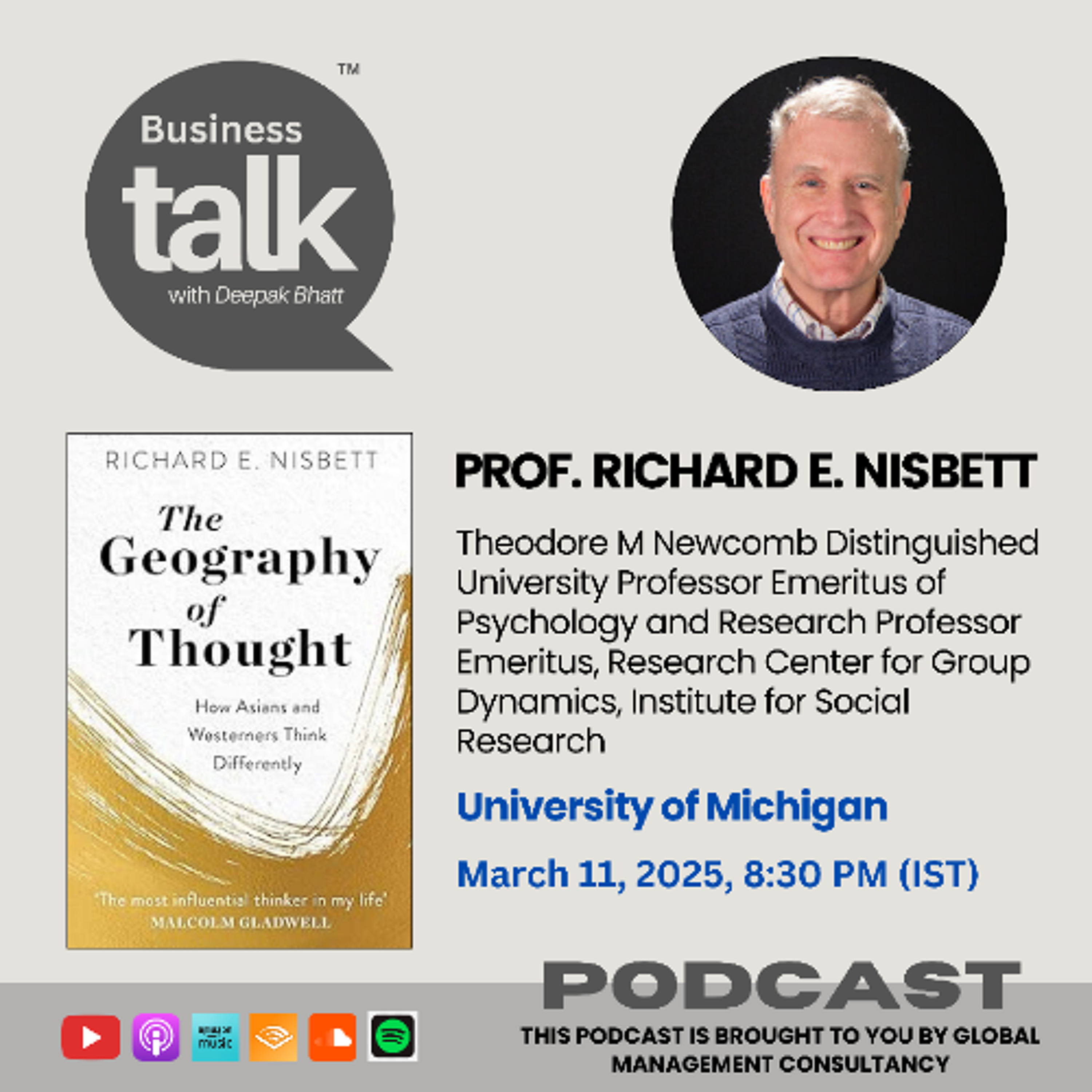 Business TalkHow Asians and Westerners Think Differently? Prof. Richard Nisbett ExplainsProf. Richard Nisbett, Theodore M. Newcomb Distinguished University Professor Emeritus of Psychology and Research Professor Emeritus at the Research Center for Group Dynamics, Institute for Social Research, University of Michigan, shares insights from his widely acclaimed book, The Geography of Thought: How Asians and Westerners Think Differently.
In this thought-provoking work, Prof. Nisbett explores the fundamental cognitive differences between Eastern and Western cultures, shedding light on how history, philosophy, and social structures shape the way people perceive, reason, and make decisions. His insights offer valuable perspectives on cultural intelligence, decision-making, and global collaboration.
Prof. Nisbett's research focuses on culture and...2025-03-1728 min
Business TalkHow Asians and Westerners Think Differently? Prof. Richard Nisbett ExplainsProf. Richard Nisbett, Theodore M. Newcomb Distinguished University Professor Emeritus of Psychology and Research Professor Emeritus at the Research Center for Group Dynamics, Institute for Social Research, University of Michigan, shares insights from his widely acclaimed book, The Geography of Thought: How Asians and Westerners Think Differently.
In this thought-provoking work, Prof. Nisbett explores the fundamental cognitive differences between Eastern and Western cultures, shedding light on how history, philosophy, and social structures shape the way people perceive, reason, and make decisions. His insights offer valuable perspectives on cultural intelligence, decision-making, and global collaboration.
Prof. Nisbett's research focuses on culture and...2025-03-1728 min The Scott Townsend Show#201 Understanding the Bystander Effect: Why We Don't Always Come to the RescueHave you ever hesitated to act in an emergency, thinking someone else will surely step in? This episode peels back the layers of our psychology to reveal why our instincts might not always lead to heroism. Drawing from a segment in Daniel Kahneman's "Thinking Fast and Slow," I delve into the revealing study by Richard Nisbett and Eugene Borgida. They throw us into a scenario where an individual in distress might not receive the help they need due to the silent assumption that another bystander will intervene. It's a chilling realization that inaction can be just as impactful as...2024-05-1416 min
The Scott Townsend Show#201 Understanding the Bystander Effect: Why We Don't Always Come to the RescueHave you ever hesitated to act in an emergency, thinking someone else will surely step in? This episode peels back the layers of our psychology to reveal why our instincts might not always lead to heroism. Drawing from a segment in Daniel Kahneman's "Thinking Fast and Slow," I delve into the revealing study by Richard Nisbett and Eugene Borgida. They throw us into a scenario where an individual in distress might not receive the help they need due to the silent assumption that another bystander will intervene. It's a chilling realization that inaction can be just as impactful as...2024-05-1416 min The Business Spotlight SeriesHOW WE EVOLVED OUR BUSINESS INTO BEING SUCCESSFUL | With Richard Nisbett and Mark Sharp | The Business SpotlightATP Enable They provide a variety of remote 3G, 4G, 5G and IoT Sim connectivity solutions to help connect and secure businesses across the world.On this episode of TBS, Richard at ATP Enable enlightens us with his humble beginnings at various Costa Coffees in London, through to garden furniture in his garage and then evolving into the offices they now have in Hertfordshire's beautiful Buntingford. Richard goes on to tell us about the subtle art of delegation and they are pioneering the SIM market and cyber protection!🔔 Want your business to be fea...2024-05-1312 min
The Business Spotlight SeriesHOW WE EVOLVED OUR BUSINESS INTO BEING SUCCESSFUL | With Richard Nisbett and Mark Sharp | The Business SpotlightATP Enable They provide a variety of remote 3G, 4G, 5G and IoT Sim connectivity solutions to help connect and secure businesses across the world.On this episode of TBS, Richard at ATP Enable enlightens us with his humble beginnings at various Costa Coffees in London, through to garden furniture in his garage and then evolving into the offices they now have in Hertfordshire's beautiful Buntingford. Richard goes on to tell us about the subtle art of delegation and they are pioneering the SIM market and cyber protection!🔔 Want your business to be fea...2024-05-1312 min The Dissenter#890 Richard Nisbett: Attribution Theory, Intelligence, and Cognitive Differences Across Cultures------------------Support the channel------------
Patreon: https://www.patreon.com/thedissenter
PayPal: paypal.me/thedissenter
PayPal Subscription 1 Dollar: https://tinyurl.com/yb3acuuy
PayPal Subscription 3 Dollars: https://tinyurl.com/ybn6bg9l
PayPal Subscription 5 Dollars: https://tinyurl.com/ycmr9gpz
PayPal Subscription 10 Dollars: https://tinyurl.com/y9r3fc9m
PayPal Subscription 20 Dollars: https://tinyurl.com/y95uvkao
------------------Follow me on---------------------
Facebook: https://www.facebook.com/thedissenteryt/
Twitter: https://twitter.com/TheDissenterYT
This show is sp...2024-01-221h 09
The Dissenter#890 Richard Nisbett: Attribution Theory, Intelligence, and Cognitive Differences Across Cultures------------------Support the channel------------
Patreon: https://www.patreon.com/thedissenter
PayPal: paypal.me/thedissenter
PayPal Subscription 1 Dollar: https://tinyurl.com/yb3acuuy
PayPal Subscription 3 Dollars: https://tinyurl.com/ybn6bg9l
PayPal Subscription 5 Dollars: https://tinyurl.com/ycmr9gpz
PayPal Subscription 10 Dollars: https://tinyurl.com/y9r3fc9m
PayPal Subscription 20 Dollars: https://tinyurl.com/y95uvkao
------------------Follow me on---------------------
Facebook: https://www.facebook.com/thedissenteryt/
Twitter: https://twitter.com/TheDissenterYT
This show is sp...2024-01-221h 09 Nullius in VerbaEpisode 23: Contra Creativitatem Epistolae - Pars IIn the first of a two-part episode, we discuss The Anticreativity Letters by Richard Nisbett, in which a senior "tempter" advises a junior tempter on ways to prevent a young psychologist from being a productive and creative scientist.
Nisbett, R. E. (1990). The anticreativity letters: Advice from a senior tempter to a junior tempter. American Psychologist, 45(9), 1078–1082.
BMJ Christmas issue: https://www.bmj.com/about-bmj/resources-authors/article-types/christmas-issue
Quote by Ira Glass: https://www.goodreads.com/quotes/309485-nobody-tells-this-to-people-who-are-beginners-i-wish
2023-12-1548 min
Nullius in VerbaEpisode 23: Contra Creativitatem Epistolae - Pars IIn the first of a two-part episode, we discuss The Anticreativity Letters by Richard Nisbett, in which a senior "tempter" advises a junior tempter on ways to prevent a young psychologist from being a productive and creative scientist.
Nisbett, R. E. (1990). The anticreativity letters: Advice from a senior tempter to a junior tempter. American Psychologist, 45(9), 1078–1082.
BMJ Christmas issue: https://www.bmj.com/about-bmj/resources-authors/article-types/christmas-issue
Quote by Ira Glass: https://www.goodreads.com/quotes/309485-nobody-tells-this-to-people-who-are-beginners-i-wish
2023-12-1548 min Nullius in VerbaEpisode 23: Contra Creativitatem Epistolae - Pars IIn the first of a two-part episode, we discuss The Anticreativity Letters by Richard Nisbett, in which a senior "tempter" advises a junior tempter on ways to prevent a young psychologist from being a productive and creative scientist.
Nisbett, R. E. (1990). The anticreativity letters: Advice from a senior tempter to a junior tempter. American Psychologist, 45(9), 1078–1082.
BMJ Christmas issue: https://www.bmj.com/about-bmj/resources-authors/article-types/christmas-issue
Quote by Ira Glass: https://www.goodreads.com/quotes/309485-nobody-tells-this-to-people-who-are-beginners-i-wish
2023-12-1548 min
Nullius in VerbaEpisode 23: Contra Creativitatem Epistolae - Pars IIn the first of a two-part episode, we discuss The Anticreativity Letters by Richard Nisbett, in which a senior "tempter" advises a junior tempter on ways to prevent a young psychologist from being a productive and creative scientist.
Nisbett, R. E. (1990). The anticreativity letters: Advice from a senior tempter to a junior tempter. American Psychologist, 45(9), 1078–1082.
BMJ Christmas issue: https://www.bmj.com/about-bmj/resources-authors/article-types/christmas-issue
Quote by Ira Glass: https://www.goodreads.com/quotes/309485-nobody-tells-this-to-people-who-are-beginners-i-wish
2023-12-1548 min BibliyoterapiDüşünmek İstemiyorum
Bibliyoterapi'nin bu bölümünde Aslı ve Tuna, düşünmek üstüne düşünüyorlar.Kitaplar;Mindware - Etkili Düşünme Araçları: Richard NisbettSeneler: Annie ErnauxBeyin Senin Hikayen: David EaglemanMeditasyonun Esasları: David FontanaAslı ve Tuna’ya bibliyoterapi@podbeemedia.com mail adresinden yazabilirsiniz.See Privacy Policy at https://art19.com/privacy and California Privacy Notice at https://art19.com/privacy#do-not-sell-my-info.
2023-12-0142 min
BibliyoterapiDüşünmek İstemiyorum
Bibliyoterapi'nin bu bölümünde Aslı ve Tuna, düşünmek üstüne düşünüyorlar.Kitaplar;Mindware - Etkili Düşünme Araçları: Richard NisbettSeneler: Annie ErnauxBeyin Senin Hikayen: David EaglemanMeditasyonun Esasları: David FontanaAslı ve Tuna’ya bibliyoterapi@podbeemedia.com mail adresinden yazabilirsiniz.See Privacy Policy at https://art19.com/privacy and California Privacy Notice at https://art19.com/privacy#do-not-sell-my-info.
2023-12-0142 min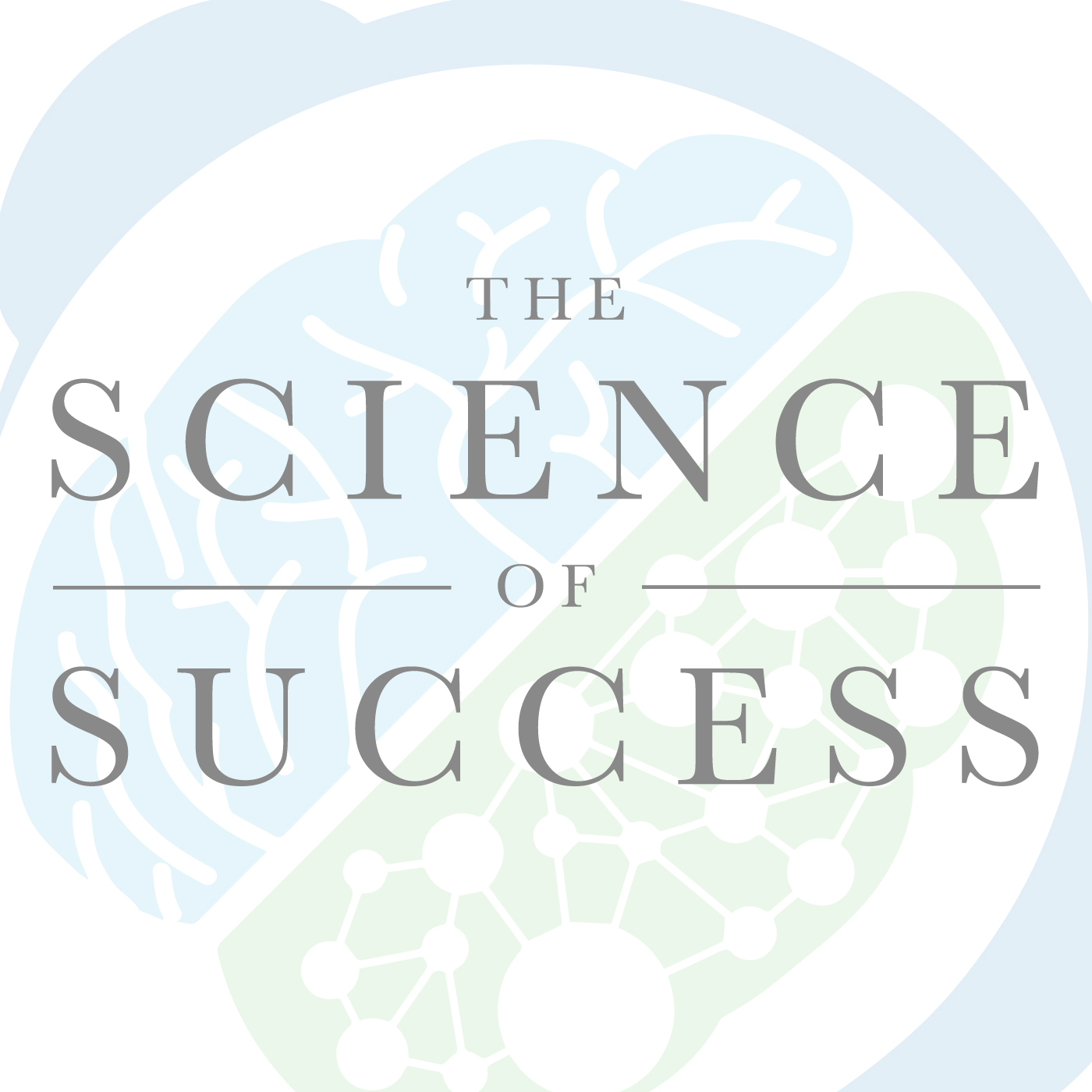 The Science of SuccessMaking Better Decisions, The Sophomore Jinx, & The Illusion of Objectivity with Dr. Richard NisbettIn this episode we discuss the errors people make in their reasoning and how to correct them, we explain a number of statistical principles to help sharpen your thinking and make you a better decision maker, why every $1 spent on a “scared straight” program creates $400 of cost for the criminal justice system, the illusion of objectivity, why you should NOT rely on your intuition and much more with Dr. Richard Nisbett. See Privacy Policy at https://art19.com/privacy and California Privacy Notice at https://art19.com/privacy#do-not-sell-my-info.2023-10-2650 min
The Science of SuccessMaking Better Decisions, The Sophomore Jinx, & The Illusion of Objectivity with Dr. Richard NisbettIn this episode we discuss the errors people make in their reasoning and how to correct them, we explain a number of statistical principles to help sharpen your thinking and make you a better decision maker, why every $1 spent on a “scared straight” program creates $400 of cost for the criminal justice system, the illusion of objectivity, why you should NOT rely on your intuition and much more with Dr. Richard Nisbett. See Privacy Policy at https://art19.com/privacy and California Privacy Notice at https://art19.com/privacy#do-not-sell-my-info.2023-10-2650 min Education Bookcast149. How Popular Musicians Learn by Lucy GreenA lot of the classic expertise research, especially the research about deliberate practice and the "10,000 hour rule", is inspired by K. Anders Ericcson's study of violinists at the Berlin Conservatory. However, we have seen before how misleading sampling a particular culture and generalising the findings over the whole of humanity can be. Thankfully, Lucy Green's How Popular Musicians Learn gives us something of an antidote to this classical music bias. Green's book is based on interviews with 14 musicians in south-east England, of which 13 were instrumentalists and one, a singer. Their musical genres were all "guitar-based popular music" wh...2023-10-2347 min
Education Bookcast149. How Popular Musicians Learn by Lucy GreenA lot of the classic expertise research, especially the research about deliberate practice and the "10,000 hour rule", is inspired by K. Anders Ericcson's study of violinists at the Berlin Conservatory. However, we have seen before how misleading sampling a particular culture and generalising the findings over the whole of humanity can be. Thankfully, Lucy Green's How Popular Musicians Learn gives us something of an antidote to this classical music bias. Green's book is based on interviews with 14 musicians in south-east England, of which 13 were instrumentalists and one, a singer. Their musical genres were all "guitar-based popular music" wh...2023-10-2347 min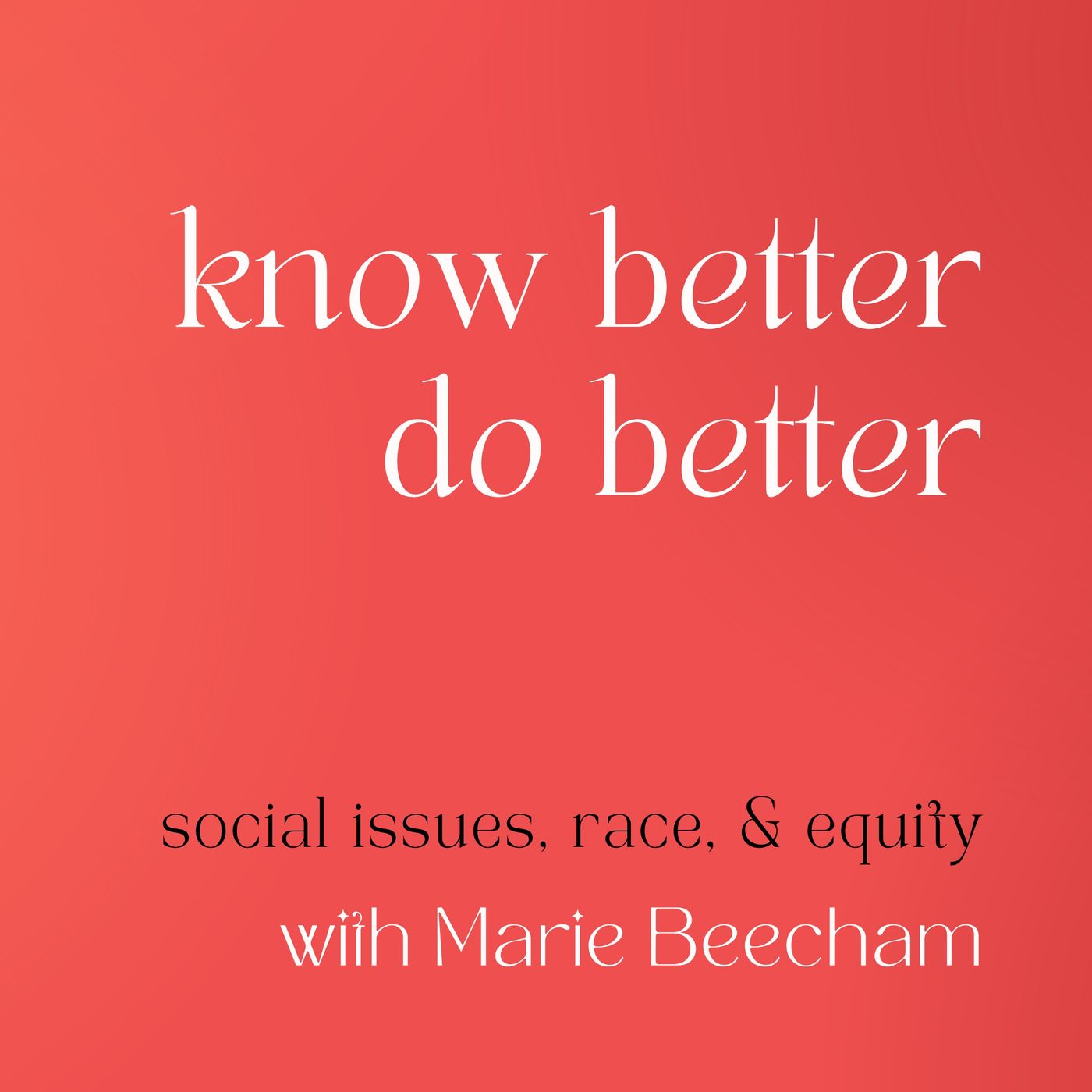 Know Better Do Better77. How Do We Actually Close "Achievement Gaps"?In this episode, we uncover a point of contention that's easy to miss, but it's the source of deep divides. Learn what it is, why it matters, and what the experts have to say about it.Your listen next list:Learn Critical Race Theory in 20 Minutes on Apple & SpotifyWhen & How To Talk With People of Color About Race on Apple & SpotifySource: Whistling Vivaldi by Dr. Claude Steele; research conducted by Edward Jones and Richard Nisbett.To support Marie and get exclusive resources, head to patreon.com/mariebeech. To learn more...2023-08-1522 min
Know Better Do Better77. How Do We Actually Close "Achievement Gaps"?In this episode, we uncover a point of contention that's easy to miss, but it's the source of deep divides. Learn what it is, why it matters, and what the experts have to say about it.Your listen next list:Learn Critical Race Theory in 20 Minutes on Apple & SpotifyWhen & How To Talk With People of Color About Race on Apple & SpotifySource: Whistling Vivaldi by Dr. Claude Steele; research conducted by Edward Jones and Richard Nisbett.To support Marie and get exclusive resources, head to patreon.com/mariebeech. To learn more...2023-08-1522 min Crazy Enough to Win (For Those Who Love the Game of Business)Why Do We Misjudge Others? Understanding Fundamental Attribution ErrorSend us a textI have made this concept easy to understand. Don't miss the ending. But first, I need to give you the foundation for this to make sense. The fundamental attribution error (FAE), also known as the correspondence bias or attribution effect, is a cognitive bias that influences how individuals perceive and interpret the behavior of others. Coined by social psychologists Lee Ross and Richard Nisbett in 1977, the FAE refers to the tendency of people to overemphasize dispositional or personality-based explanations for the actions of others while underestimating situational factors. This article explores the origins, key...2023-08-0720 min
Crazy Enough to Win (For Those Who Love the Game of Business)Why Do We Misjudge Others? Understanding Fundamental Attribution ErrorSend us a textI have made this concept easy to understand. Don't miss the ending. But first, I need to give you the foundation for this to make sense. The fundamental attribution error (FAE), also known as the correspondence bias or attribution effect, is a cognitive bias that influences how individuals perceive and interpret the behavior of others. Coined by social psychologists Lee Ross and Richard Nisbett in 1977, the FAE refers to the tendency of people to overemphasize dispositional or personality-based explanations for the actions of others while underestimating situational factors. This article explores the origins, key...2023-08-0720 min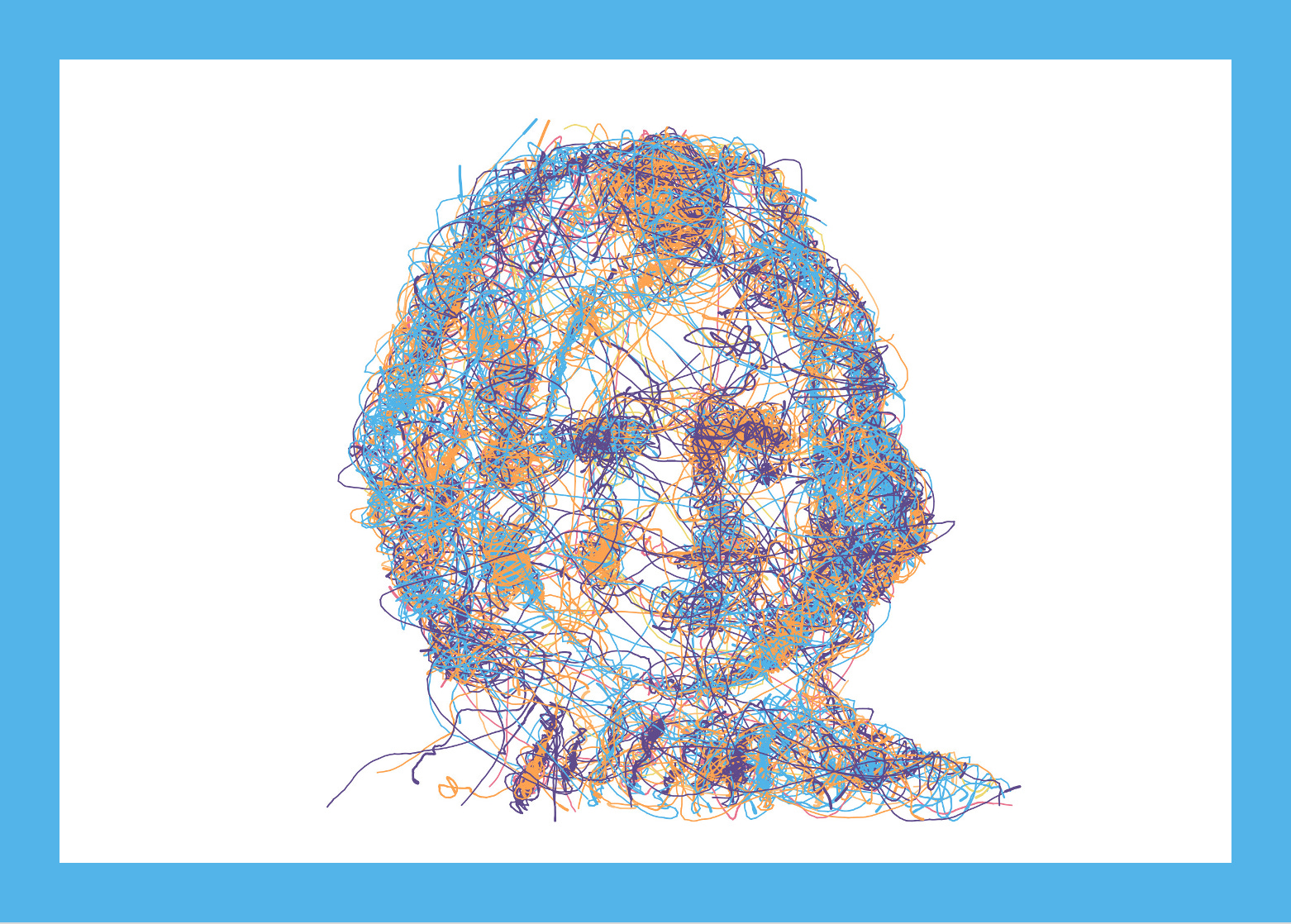 Cognitive Revolution#107: How a really good travel writer approaches her experiences abroad—and at home (feat. Erika Fatland)The Person and the Situation is a book by social psychologists Lee Ross and Richard Nisbett, originally published in 1991. The argument made by Ross and Nisbett was that context matters. Human beings don’t behave in a vacuum, unaffected by the circumstances of society, history, and culture. The job of the social psychologist is to understand both the person and the situation. Without a proper appreciation of the larger context, it’s impossible to know what to make of any given observation about human behavior.But a limitation of the project set out by Ross and Nisbett is t...2023-04-251h 00
Cognitive Revolution#107: How a really good travel writer approaches her experiences abroad—and at home (feat. Erika Fatland)The Person and the Situation is a book by social psychologists Lee Ross and Richard Nisbett, originally published in 1991. The argument made by Ross and Nisbett was that context matters. Human beings don’t behave in a vacuum, unaffected by the circumstances of society, history, and culture. The job of the social psychologist is to understand both the person and the situation. Without a proper appreciation of the larger context, it’s impossible to know what to make of any given observation about human behavior.But a limitation of the project set out by Ross and Nisbett is t...2023-04-251h 00 Podcast#107: How a really good travel writer approaches her experiences abroad—and at home (feat. Erika Fatland)The Person and the Situation is a book by social psychologists Lee Ross and Richard Nisbett, originally published in 1991. The argument made by Ross and Nisbett was that context matters. Human beings don’t behave in a vacuum, unaffected by the circumstances of society, history, and culture. The job of the social psychologist is to understand both the person and the situation. Without a proper appreciation of the larger context, it’s impossible to know what to make of any given observation about human behavior.But a limitation of the project set out by Ross and Nisbett is t...2023-04-251h 00
Podcast#107: How a really good travel writer approaches her experiences abroad—and at home (feat. Erika Fatland)The Person and the Situation is a book by social psychologists Lee Ross and Richard Nisbett, originally published in 1991. The argument made by Ross and Nisbett was that context matters. Human beings don’t behave in a vacuum, unaffected by the circumstances of society, history, and culture. The job of the social psychologist is to understand both the person and the situation. Without a proper appreciation of the larger context, it’s impossible to know what to make of any given observation about human behavior.But a limitation of the project set out by Ross and Nisbett is t...2023-04-251h 00 Fifth Chrome Business InsightsS3 - E2: How has the culture changed in M&A since the 90s - with Senior Practitioner Alain BridouxHow has the culture changed in M&A since the 90s? This is the topic of this podcast on M&A Stories on Culture with Senior Practitioner Alain Bridoux.
Show Notes:
In the 90s, American companies dominated the M&A industry with a focus on "alignment." But as Alain Bridoux points out in our latest podcast episode, culture is so much more than just alignment. He delves into the impact of national culture on organizations and the importance of considering culture during the due diligence process. Don't miss this thought-provoking episode where Alain also shares insi...2023-01-2443 min
Fifth Chrome Business InsightsS3 - E2: How has the culture changed in M&A since the 90s - with Senior Practitioner Alain BridouxHow has the culture changed in M&A since the 90s? This is the topic of this podcast on M&A Stories on Culture with Senior Practitioner Alain Bridoux.
Show Notes:
In the 90s, American companies dominated the M&A industry with a focus on "alignment." But as Alain Bridoux points out in our latest podcast episode, culture is so much more than just alignment. He delves into the impact of national culture on organizations and the importance of considering culture during the due diligence process. Don't miss this thought-provoking episode where Alain also shares insi...2023-01-2443 min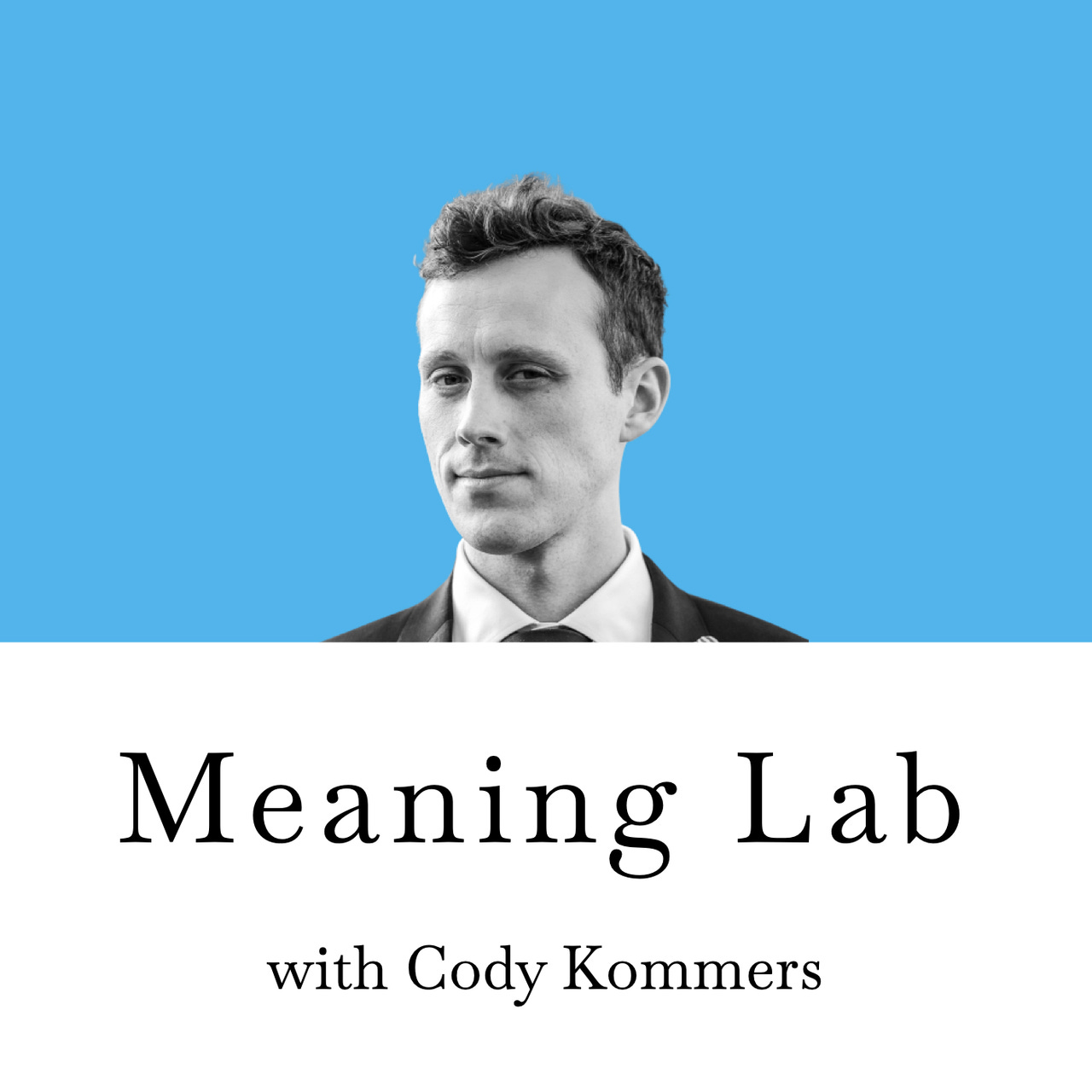 Podcast#97: Is the Biggest Fish in the Pond Happy? (feat. W. David Marx)One of my favorite psychology papers of all time is called “Telling More than We Can Know” by Richard Nisbett and Timothy Wilson. The argument of the paper is that humans don’t actually know why they do what they do. But they’re more than happy to give you an explanation nonetheless.This the reason why we need a science of human behavior. If we could all just intuit the correct answers automatically, there’d be no need for researchers to figure them out. This provides a kind of template for how psychological research works: I got the hu...2022-12-201h 20
Podcast#97: Is the Biggest Fish in the Pond Happy? (feat. W. David Marx)One of my favorite psychology papers of all time is called “Telling More than We Can Know” by Richard Nisbett and Timothy Wilson. The argument of the paper is that humans don’t actually know why they do what they do. But they’re more than happy to give you an explanation nonetheless.This the reason why we need a science of human behavior. If we could all just intuit the correct answers automatically, there’d be no need for researchers to figure them out. This provides a kind of template for how psychological research works: I got the hu...2022-12-201h 20 Live on Purpose RadioWe Know We Are Right – That’s The Problem – Episode #524
A little over a year ago, Dr. Paul interviewed Dr. Richard Nisbett in an episode of Live On Purpose Radio called “Thinking About Thinking“. In this episode, Dr. Paul reflects on that conversation with one of the most troubling aspects of human psychology – knowing that we are right. This has us showing up in ways that generate problems. Ready for a little coaching to get out of your own head trash? Get your FREE coaching consultation with Dr. Paul’s team right here: https://liveonpurposeradio.com/coaching
2022-12-0125 min
Live on Purpose RadioWe Know We Are Right – That’s The Problem – Episode #524
A little over a year ago, Dr. Paul interviewed Dr. Richard Nisbett in an episode of Live On Purpose Radio called “Thinking About Thinking“. In this episode, Dr. Paul reflects on that conversation with one of the most troubling aspects of human psychology – knowing that we are right. This has us showing up in ways that generate problems. Ready for a little coaching to get out of your own head trash? Get your FREE coaching consultation with Dr. Paul’s team right here: https://liveonpurposeradio.com/coaching
2022-12-0125 min Authors and Books – Live on Purpose RadioWe Know We Are Right – That’s The Problem – Episode #524
A little over a year ago, Dr. Paul interviewed Dr. Richard Nisbett in an episode of Live On Purpose Radio called “Thinking About Thinking“. In this episode, Dr. Paul reflects on that conversation with one of the most troubling aspects of human psychology – knowing that we are right. This has us showing up in ways that generate problems. Ready for a little coaching to get out of your own head trash? Get your FREE coaching consultation with Dr. Paul’s team right here: https://liveonpurposeradio.com/coaching
2022-12-0125 min
Authors and Books – Live on Purpose RadioWe Know We Are Right – That’s The Problem – Episode #524
A little over a year ago, Dr. Paul interviewed Dr. Richard Nisbett in an episode of Live On Purpose Radio called “Thinking About Thinking“. In this episode, Dr. Paul reflects on that conversation with one of the most troubling aspects of human psychology – knowing that we are right. This has us showing up in ways that generate problems. Ready for a little coaching to get out of your own head trash? Get your FREE coaching consultation with Dr. Paul’s team right here: https://liveonpurposeradio.com/coaching
2022-12-0125 min Live on Purpose RadioWe Know We Are Right – That’s The Problem – Episode #524
A little over a year ago, Dr. Paul interviewed Dr. Richard Nisbett in an episode of Live On Purpose Radio called “Thinking About Thinking“. In this episode, Dr. Paul reflects on that conversation with one of the most troubling aspects of human psychology – knowing that we are right. This has us showing up in ways that generate problems. Ready for a little coaching to get out of your own head trash? Get your FREE coaching consultation with Dr. Paul’s team right here: https://liveonpurposeradio.com/coaching
2022-12-0125 min
Live on Purpose RadioWe Know We Are Right – That’s The Problem – Episode #524
A little over a year ago, Dr. Paul interviewed Dr. Richard Nisbett in an episode of Live On Purpose Radio called “Thinking About Thinking“. In this episode, Dr. Paul reflects on that conversation with one of the most troubling aspects of human psychology – knowing that we are right. This has us showing up in ways that generate problems. Ready for a little coaching to get out of your own head trash? Get your FREE coaching consultation with Dr. Paul’s team right here: https://liveonpurposeradio.com/coaching
2022-12-0125 min Live on Purpose RadioWe Know We Are Right – That’s The Problem – Episode #524
A little over a year ago, Dr. Paul interviewed Dr. Richard Nisbett in an episode of Live On Purpose Radio called “Thinking About Thinking“. In this episode, Dr. Paul reflects on that conversation with one of the most troubling aspects of human psychology – knowing that we are right. This has us showing up in ways that generate problems. Ready for a little coaching to get out of your own head trash? Get your FREE coaching consultation with Dr. Paul’s team right here: https://liveonpurposeradio.com/coaching
2022-12-0125 min
Live on Purpose RadioWe Know We Are Right – That’s The Problem – Episode #524
A little over a year ago, Dr. Paul interviewed Dr. Richard Nisbett in an episode of Live On Purpose Radio called “Thinking About Thinking“. In this episode, Dr. Paul reflects on that conversation with one of the most troubling aspects of human psychology – knowing that we are right. This has us showing up in ways that generate problems. Ready for a little coaching to get out of your own head trash? Get your FREE coaching consultation with Dr. Paul’s team right here: https://liveonpurposeradio.com/coaching
2022-12-0125 min Psychology and Self Improvement – Live on Purpose RadioWe Know We Are Right – That’s The Problem – Episode #524
A little over a year ago, Dr. Paul interviewed Dr. Richard Nisbett in an episode of Live On Purpose Radio called “Thinking About Thinking“. In this episode, Dr. Paul reflects on that conversation with one of the most troubling aspects of human psychology – knowing that we are right. This has us showing up in ways that generate problems. Ready for a little coaching to get out of your own head trash? Get your FREE coaching consultation with Dr. Paul’s team right here: https://liveonpurposeradio.com/coaching
2022-12-0125 min
Psychology and Self Improvement – Live on Purpose RadioWe Know We Are Right – That’s The Problem – Episode #524
A little over a year ago, Dr. Paul interviewed Dr. Richard Nisbett in an episode of Live On Purpose Radio called “Thinking About Thinking“. In this episode, Dr. Paul reflects on that conversation with one of the most troubling aspects of human psychology – knowing that we are right. This has us showing up in ways that generate problems. Ready for a little coaching to get out of your own head trash? Get your FREE coaching consultation with Dr. Paul’s team right here: https://liveonpurposeradio.com/coaching
2022-12-0125 min Shifting CultureEp. 79 Craig Greenfield - Subversive MissionIn this episode Craig Greenfield shares his story living in the slums of Cambodia, raising indigenous leaders from the beginning, finding our way as missionaries, and how the five-fold applies in cross-cultural work.Craig is the founder and director of Alongsiders International - a fast-growing movement mobilizing and equipping thousands of young Christians in 25 countries to walk alongside those who walk alone - orphans and vulnerable children in their own communities.During more than 20 years living and ministering in slums and inner cities in Asia and North America, Craig has established a number of initiatives...2022-11-0154 min
Shifting CultureEp. 79 Craig Greenfield - Subversive MissionIn this episode Craig Greenfield shares his story living in the slums of Cambodia, raising indigenous leaders from the beginning, finding our way as missionaries, and how the five-fold applies in cross-cultural work.Craig is the founder and director of Alongsiders International - a fast-growing movement mobilizing and equipping thousands of young Christians in 25 countries to walk alongside those who walk alone - orphans and vulnerable children in their own communities.During more than 20 years living and ministering in slums and inner cities in Asia and North America, Craig has established a number of initiatives...2022-11-0154 min Toddy On The PoddyEp.11 Richard ProsserI sit down with one of my great mates who i was lucky enough to be an assistant coach too. Great bloke and very talented footballer! This guy has done a lot on his journey and we dive deep into it all. Lets get it!2022-08-3059 min
Toddy On The PoddyEp.11 Richard ProsserI sit down with one of my great mates who i was lucky enough to be an assistant coach too. Great bloke and very talented footballer! This guy has done a lot on his journey and we dive deep into it all. Lets get it!2022-08-3059 min Lessons with DadIntelligence and How to Get It - Part 3, How to get SmarterThe conclusion to the book Intelligence and How to Get It by Richard Nisbett.2022-08-2129 min
Lessons with DadIntelligence and How to Get It - Part 3, How to get SmarterThe conclusion to the book Intelligence and How to Get It by Richard Nisbett.2022-08-2129 min Lessons with DadIntelligence and How to Get It - Part 2, What Makes a Good Teacher/TutorIntelligence and How to Get It by Richard Nisbett. Are we Smarter than our Grandparents?
We discuss what makes good schools, teachers and tutors and give some ideas on how you can increase your intelligence.
For more information on Cooperative Learning, check out Robert Slavin's book on these techniques.
TUTORS
A lot of teaching is in the form of 1-on-1 teaching from tutors. Mark Lepper did research on this and made some great discoveries:
A surefire way to be a BAD tutor:
-Consider yourself a debugger. Explicitly tell the student she has made a mistake and give direct guidance in...2022-08-1926 min
Lessons with DadIntelligence and How to Get It - Part 2, What Makes a Good Teacher/TutorIntelligence and How to Get It by Richard Nisbett. Are we Smarter than our Grandparents?
We discuss what makes good schools, teachers and tutors and give some ideas on how you can increase your intelligence.
For more information on Cooperative Learning, check out Robert Slavin's book on these techniques.
TUTORS
A lot of teaching is in the form of 1-on-1 teaching from tutors. Mark Lepper did research on this and made some great discoveries:
A surefire way to be a BAD tutor:
-Consider yourself a debugger. Explicitly tell the student she has made a mistake and give direct guidance in...2022-08-1926 min Lessons with DadIntelligence and How to Get It - Part 1, Does School Make You Smarter?Intelligence and How to Get It by Richard Nisbett. Review IQ scores, the impact of school on intelligence and Heritability vs. Mutability.2022-08-1229 min
Lessons with DadIntelligence and How to Get It - Part 1, Does School Make You Smarter?Intelligence and How to Get It by Richard Nisbett. Review IQ scores, the impact of school on intelligence and Heritability vs. Mutability.2022-08-1229 min Choiceology with Katy MilkmanSecond-Guessing First Impressions: With Guests Allen Sarven & Richard NisbettDon’t shoot the messenger is a metaphorical phrase for blaming the bearer of bad news. It’s easy to be angry with someone who is associated with information you don’t want to hear–say, a doctor delivering an unwelcome diagnosis, or a manager who has to fire you due to budget issues beyond her control. The phrase also points to a tendency we all have to overweight someone’s personality or disposition (that person who fired me is a jerk) and underweight the situation (sales were down this year, and they can’t afford current staffing levels).In this...2022-03-2832 min
Choiceology with Katy MilkmanSecond-Guessing First Impressions: With Guests Allen Sarven & Richard NisbettDon’t shoot the messenger is a metaphorical phrase for blaming the bearer of bad news. It’s easy to be angry with someone who is associated with information you don’t want to hear–say, a doctor delivering an unwelcome diagnosis, or a manager who has to fire you due to budget issues beyond her control. The phrase also points to a tendency we all have to overweight someone’s personality or disposition (that person who fired me is a jerk) and underweight the situation (sales were down this year, and they can’t afford current staffing levels).In this...2022-03-2832 min A-Typisch (ondernemen)Afl 43: A-Typisch ondernemen: Rik VeraAfl 43: A-Typisch ondernemen: Rik Vera
Onder het motto "brave meisjes komen in de hemel, stoute overal!" trok ik opnieuw mijn stoute schoenen aan en sprak Rik Vera aan, op een netwerk-event gehost door Suyin Aerts: of hij zich een ondernemer voelde? En of hij tijd wou/kon vrijmaken voor mijn a-typische ondernemersvragen? Dat zag hij wel zitten ;-)
Geheel toevallig is Rik in het onderwijs gerold, maar nadien kwam hij toch onverwacht in het bedrijfsleven terecht, waar hij pijlsnel omhoog schiet...
Hoe deed hij dat? Hij gedraagt zich graag als "Kuifje in Afrika"...2022-03-1042 min
A-Typisch (ondernemen)Afl 43: A-Typisch ondernemen: Rik VeraAfl 43: A-Typisch ondernemen: Rik Vera
Onder het motto "brave meisjes komen in de hemel, stoute overal!" trok ik opnieuw mijn stoute schoenen aan en sprak Rik Vera aan, op een netwerk-event gehost door Suyin Aerts: of hij zich een ondernemer voelde? En of hij tijd wou/kon vrijmaken voor mijn a-typische ondernemersvragen? Dat zag hij wel zitten ;-)
Geheel toevallig is Rik in het onderwijs gerold, maar nadien kwam hij toch onverwacht in het bedrijfsleven terecht, waar hij pijlsnel omhoog schiet...
Hoe deed hij dat? Hij gedraagt zich graag als "Kuifje in Afrika"...2022-03-1042 min Psych FlowThe psychology of thinking and free will; an interview with a Distinguished influence in the field: Richard Nisbett.This interview has been the singular most influential and outstanding achievement in my career and academic life so far. A discussion with an award winning psychologist which sheds light on the working of the brain, free will, consciousness and influence of behaviour. We discuss Richard's newest memoir; Thinking, which is now available to purchase using the links below:Amazon: https://www.amazon.co.uk/Thinking-memoir-Richard-Nisbett/dp/0578854678/ref=ascEbay: https://www.ebay.co.uk/itm/194242991272?chn=ps&Wob: https://www.wob.com/en-gb/books/richard-e-nisbett/thinking/9780578854670?gclid=CjwKCAiAx8KQBhAGEiwAD3EiP84hxzhdg...2022-02-1959 min
Psych FlowThe psychology of thinking and free will; an interview with a Distinguished influence in the field: Richard Nisbett.This interview has been the singular most influential and outstanding achievement in my career and academic life so far. A discussion with an award winning psychologist which sheds light on the working of the brain, free will, consciousness and influence of behaviour. We discuss Richard's newest memoir; Thinking, which is now available to purchase using the links below:Amazon: https://www.amazon.co.uk/Thinking-memoir-Richard-Nisbett/dp/0578854678/ref=ascEbay: https://www.ebay.co.uk/itm/194242991272?chn=ps&Wob: https://www.wob.com/en-gb/books/richard-e-nisbett/thinking/9780578854670?gclid=CjwKCAiAx8KQBhAGEiwAD3EiP84hxzhdg...2022-02-1959 min The Yozevitch ShowCognitive biases, Amos Tversky, intelligence and the difference between East and West - Richard Nisbett in a fascinating conversation. (En)0:00 intro2:40 Should we diversify when doing research? 5:56 Lee Ross, Kahneman & Tversky 8:18 Are we "good-natured" statisticians? 15:33 We should teach more statistics 20:15 Can wasting time be productive? 27:26 The relation between IQ and "Street Smart"-ness35:40 Is IQ unitary - one measure that controls all? 47:38 The Obligatory Culture-IQ Disagreement 59:50 West vs. East in perception 1:06:48 What can we do to change a cultural landscape? 1:20:33 A magical research paper2022-02-101h 26
The Yozevitch ShowCognitive biases, Amos Tversky, intelligence and the difference between East and West - Richard Nisbett in a fascinating conversation. (En)0:00 intro2:40 Should we diversify when doing research? 5:56 Lee Ross, Kahneman & Tversky 8:18 Are we "good-natured" statisticians? 15:33 We should teach more statistics 20:15 Can wasting time be productive? 27:26 The relation between IQ and "Street Smart"-ness35:40 Is IQ unitary - one measure that controls all? 47:38 The Obligatory Culture-IQ Disagreement 59:50 West vs. East in perception 1:06:48 What can we do to change a cultural landscape? 1:20:33 A magical research paper2022-02-101h 26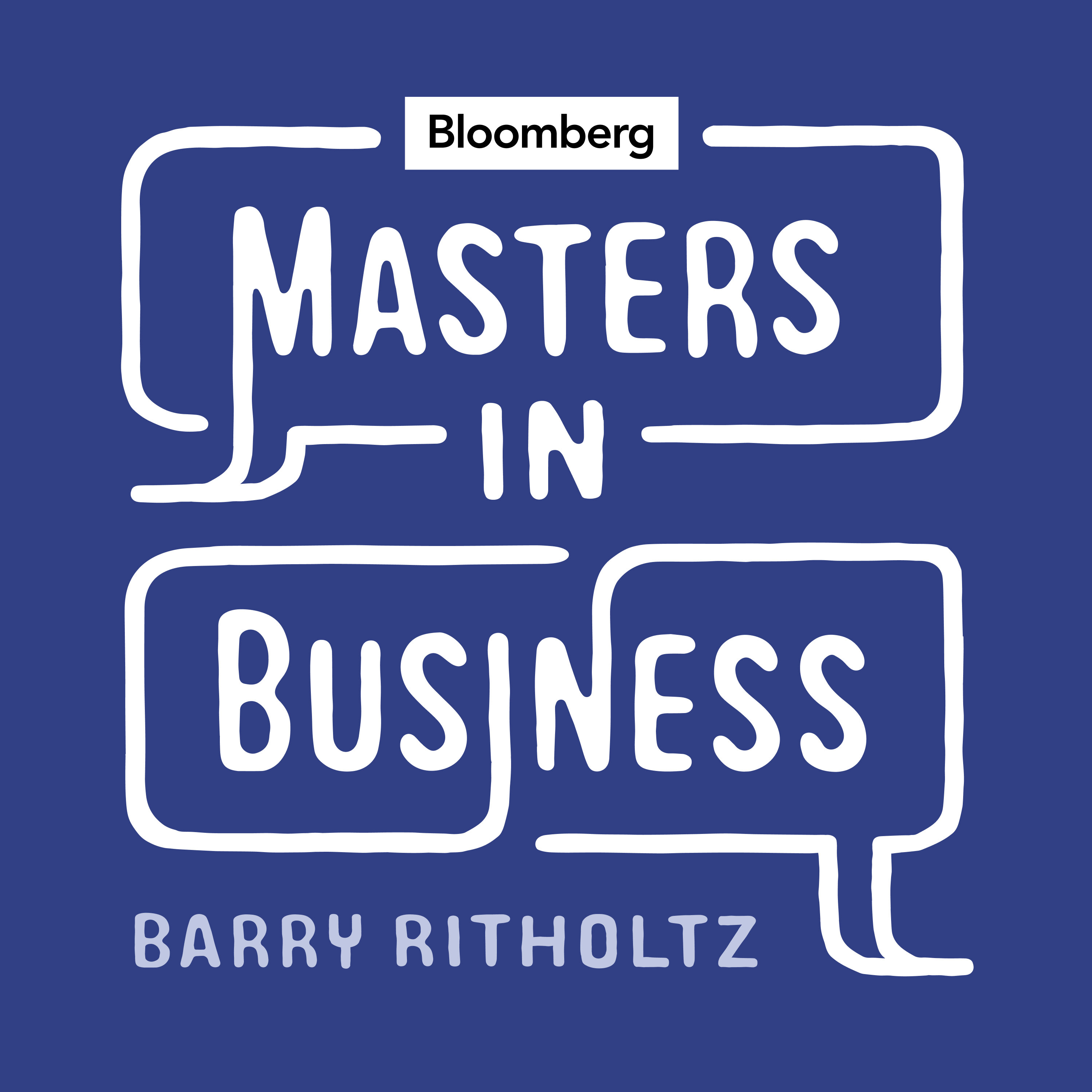 Masters in BusinessRichard Nisbett on Flawed Reasoning and Societies (Podcast)Bloomberg Opinion columnist Barry Ritholtz speaks with social psychologist Richard Nisbett, an emeritus professor at the University of Michigan who has studied how culture affects cognitive processes, among other issues. He is the author of several books, including "The Geography of Thought," "Intelligence and How to Get It," and, most recently, "Thinking: A Memoir." See omnystudio.com/listener for privacy information.2022-01-011h 34
Masters in BusinessRichard Nisbett on Flawed Reasoning and Societies (Podcast)Bloomberg Opinion columnist Barry Ritholtz speaks with social psychologist Richard Nisbett, an emeritus professor at the University of Michigan who has studied how culture affects cognitive processes, among other issues. He is the author of several books, including "The Geography of Thought," "Intelligence and How to Get It," and, most recently, "Thinking: A Memoir." See omnystudio.com/listener for privacy information.2022-01-011h 34 In Viaggio con la Psicologia.L'interpretazione erronea: psicologia sociale.Capita spesso di porsi tutta una serie di domande e di non avere la certezza che le risposte (che ci diamo), siano quelle giuste. Richard Nisbett e Stanley Schachter (1960), dimostrarono l’interpretazione erronea che le persone attribuiscono ai propri pensieri, compiendo un esperimento sugli studenti della Columbia University. Quanto è importante dubitare delle/sulle proprie scelte?Buon viaggio e buon ascolto.2021-12-2805 min
In Viaggio con la Psicologia.L'interpretazione erronea: psicologia sociale.Capita spesso di porsi tutta una serie di domande e di non avere la certezza che le risposte (che ci diamo), siano quelle giuste. Richard Nisbett e Stanley Schachter (1960), dimostrarono l’interpretazione erronea che le persone attribuiscono ai propri pensieri, compiendo un esperimento sugli studenti della Columbia University. Quanto è importante dubitare delle/sulle proprie scelte?Buon viaggio e buon ascolto.2021-12-2805 min School Psyched Podcast!SPP 138: Dr. Richard Nisbett and Critical Thinking
SPP 138: Dr. Richard Nisbett and Critical Thinking
#psychedpodcast is excited to connect with Dr. Nisbett!
https://www.richardnisbett.com/ Richard E. Nisbett is one of the world’s most respected psychologists. His work focuses on issues in social psychology and cognitive science.
Richard E. Nisbett has received the Award for Distinguished Scientific Contributions from the American Psychological Association and many other national and international awards. He is a member of the National Academy of Sciences and the American Academy of Arts and Sciences and is a recipient of the John Simon Guggenheim Fellowship. Hi...2021-12-2000 min
School Psyched Podcast!SPP 138: Dr. Richard Nisbett and Critical Thinking
SPP 138: Dr. Richard Nisbett and Critical Thinking
#psychedpodcast is excited to connect with Dr. Nisbett!
https://www.richardnisbett.com/ Richard E. Nisbett is one of the world’s most respected psychologists. His work focuses on issues in social psychology and cognitive science.
Richard E. Nisbett has received the Award for Distinguished Scientific Contributions from the American Psychological Association and many other national and international awards. He is a member of the National Academy of Sciences and the American Academy of Arts and Sciences and is a recipient of the John Simon Guggenheim Fellowship. Hi...2021-12-2000 min School Psyched!SPP 138: Dr. Richard Nisbett and Critical Thinking
SPP 138: Dr. Richard Nisbett and Critical Thinking
#psychedpodcast is excited to connect with Dr. Nisbett!
https://www.richardnisbett.com/ Richard E. Nisbett is one of the world’s most respected psychologists. His work focuses on issues in social psychology and cognitive science.
Richard E. Nisbett has received the Award for Distinguished Scientific Contributions from the American Psychological Association and many other national and international awards. He is a member of the National Academy of Sciences and the American Academy of Arts and Sciences and is a recipient of the John Simon Guggenheim Fellowship. Hi...2021-12-2000 min
School Psyched!SPP 138: Dr. Richard Nisbett and Critical Thinking
SPP 138: Dr. Richard Nisbett and Critical Thinking
#psychedpodcast is excited to connect with Dr. Nisbett!
https://www.richardnisbett.com/ Richard E. Nisbett is one of the world’s most respected psychologists. His work focuses on issues in social psychology and cognitive science.
Richard E. Nisbett has received the Award for Distinguished Scientific Contributions from the American Psychological Association and many other national and international awards. He is a member of the National Academy of Sciences and the American Academy of Arts and Sciences and is a recipient of the John Simon Guggenheim Fellowship. Hi...2021-12-2000 min On WisdomInvisible to Ourselves: A Life of a Psychological Scientist (with Richard Nisbett)A disturbing thought - might it be impossible for us to directly observe the workings of our minds? Richard Nisbett joins Igor and Charles to discuss a life lived on the cutting edge of behavioral sciences in the second part of the 20th Century. He shares tales from his groundbreaking research into our faulty mindware, discussing various biases, cultural differences in cognitive processes, our inability to directly observe our mental processes, and why job interviews are not only unhelpful but potentially harmful to our ability to hire the best person for the job. Igor is keen to learn about...2021-12-051h 11
On WisdomInvisible to Ourselves: A Life of a Psychological Scientist (with Richard Nisbett)A disturbing thought - might it be impossible for us to directly observe the workings of our minds? Richard Nisbett joins Igor and Charles to discuss a life lived on the cutting edge of behavioral sciences in the second part of the 20th Century. He shares tales from his groundbreaking research into our faulty mindware, discussing various biases, cultural differences in cognitive processes, our inability to directly observe our mental processes, and why job interviews are not only unhelpful but potentially harmful to our ability to hire the best person for the job. Igor is keen to learn about...2021-12-051h 11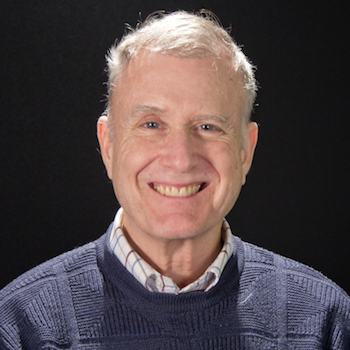 Smart People Podcast389 – Richard Nisbett – Why Your Reasoning Is Flawed and How To Fix It
Richard Nisbett, author of, Thinking: A memoir
Richard Nisbett is one of the world’s most respected psychologists. His work focuses on issues in social psychology and cognitive science. Richard is also the Theodore M. Newcomb Distinguished University Professor of Psychology Emeritus at the University of Michigan.
Richard’s most recent book is Thinking: A memoir.
Read more about Richard at his website: richardnisbett.com.
Support the Show – Become a Patron!
Help us grow and become a Patron today: https://www.patreon.com/smartpeoplepodcast
Sponsors:
Organifi – Treat yourself...2021-11-221h 00
Smart People Podcast389 – Richard Nisbett – Why Your Reasoning Is Flawed and How To Fix It
Richard Nisbett, author of, Thinking: A memoir
Richard Nisbett is one of the world’s most respected psychologists. His work focuses on issues in social psychology and cognitive science. Richard is also the Theodore M. Newcomb Distinguished University Professor of Psychology Emeritus at the University of Michigan.
Richard’s most recent book is Thinking: A memoir.
Read more about Richard at his website: richardnisbett.com.
Support the Show – Become a Patron!
Help us grow and become a Patron today: https://www.patreon.com/smartpeoplepodcast
Sponsors:
Organifi – Treat yourself...2021-11-221h 00 Smart People PodcastRichard Nisbett - Why Your Reasoning Is Flawed and How To Fix It
Richard Nisbett is one of the world's most respected psychologists. His work focuses on issues in social psychology and cognitive science. Richard is also the Theodore M. Newcomb Distinguished University Professor of Psychology Emeritus at the University of Michigan.Richard's most recent book is Thinking: A memoir.Read more about Richard at his website: richardnisbett.com.Support the Show - Become a Patron!Help us grow and become a Patron today: https://www.patreon.com/smartpeoplepodcastSponsors:Organifi - Treat yourself...2021-11-221h 02
Smart People PodcastRichard Nisbett - Why Your Reasoning Is Flawed and How To Fix It
Richard Nisbett is one of the world's most respected psychologists. His work focuses on issues in social psychology and cognitive science. Richard is also the Theodore M. Newcomb Distinguished University Professor of Psychology Emeritus at the University of Michigan.Richard's most recent book is Thinking: A memoir.Read more about Richard at his website: richardnisbett.com.Support the Show - Become a Patron!Help us grow and become a Patron today: https://www.patreon.com/smartpeoplepodcastSponsors:Organifi - Treat yourself...2021-11-221h 02 The Michael Shermer Show227. Richard Nisbett on ThinkingIn this wide-ranging conversation Shermer and Nisbett discuss Nisbett’s research showing how people reason, how people should reason, why errors in reasoning occur, how much you can improve reasoning, what kinds of problems are best solved by the conscious mind and what kinds by the unconscious mind, and how we should think about intelligence, along with the controversies over group differences and genetic influences on I.Q. scores and why Charles Murray (The Bell Curve) is wrong in inferring genetic causes for group differences in I.Q.. Nisbett also shows that self-knowledge can be dramatically off-kilter and points to...2021-11-162h 14
The Michael Shermer Show227. Richard Nisbett on ThinkingIn this wide-ranging conversation Shermer and Nisbett discuss Nisbett’s research showing how people reason, how people should reason, why errors in reasoning occur, how much you can improve reasoning, what kinds of problems are best solved by the conscious mind and what kinds by the unconscious mind, and how we should think about intelligence, along with the controversies over group differences and genetic influences on I.Q. scores and why Charles Murray (The Bell Curve) is wrong in inferring genetic causes for group differences in I.Q.. Nisbett also shows that self-knowledge can be dramatically off-kilter and points to...2021-11-162h 14 Education Bookcast121a. Attachment Theory as cultural ideologyThe title of this episode might ruffle some feathers. Attachment Theory is developmental psychology's shining star, the theory with the greatest predictive success, and one which has become popular among child psychiatrists. You can now hear it spoken about wherever child psychology is the main topic, and it has become something of a buzzword. Could this scientific theory really be "cultural ideology"? What would that even mean? Attachment Theory as Cultural Ideology is the name of an essay within the volume Multiple Faces of Attachment - Cultural Variations on a Universal Human Need which I talk about...2021-11-0159 min
Education Bookcast121a. Attachment Theory as cultural ideologyThe title of this episode might ruffle some feathers. Attachment Theory is developmental psychology's shining star, the theory with the greatest predictive success, and one which has become popular among child psychiatrists. You can now hear it spoken about wherever child psychology is the main topic, and it has become something of a buzzword. Could this scientific theory really be "cultural ideology"? What would that even mean? Attachment Theory as Cultural Ideology is the name of an essay within the volume Multiple Faces of Attachment - Cultural Variations on a Universal Human Need which I talk about...2021-11-0159 min Cool Collaborations#23 Paul Thagard - On philosophy, cognitive science, and collaboration.Welcome to episode #23 of the Cool Collaborations podcast. My guest today is Paul Thagard, PhD, a is a philosopher, cognitive scientist, and author. He is a Distinguished Professor Emeritus of Philosophy at the University of Waterloo and a Fellow of the Royal Society of Canada. He has been awarded the Molson Prize (2007) and a Killam Prize (2013) by the Canada Council for the Arts.Our conversation covers a lot of ground as we explore collaboration in the world of people, animals, and artificial intelligence, in line with the work in Paul’s new book Bots and Beasts: What Ma...2021-10-1244 min
Cool Collaborations#23 Paul Thagard - On philosophy, cognitive science, and collaboration.Welcome to episode #23 of the Cool Collaborations podcast. My guest today is Paul Thagard, PhD, a is a philosopher, cognitive scientist, and author. He is a Distinguished Professor Emeritus of Philosophy at the University of Waterloo and a Fellow of the Royal Society of Canada. He has been awarded the Molson Prize (2007) and a Killam Prize (2013) by the Canada Council for the Arts.Our conversation covers a lot of ground as we explore collaboration in the world of people, animals, and artificial intelligence, in line with the work in Paul’s new book Bots and Beasts: What Ma...2021-10-1244 min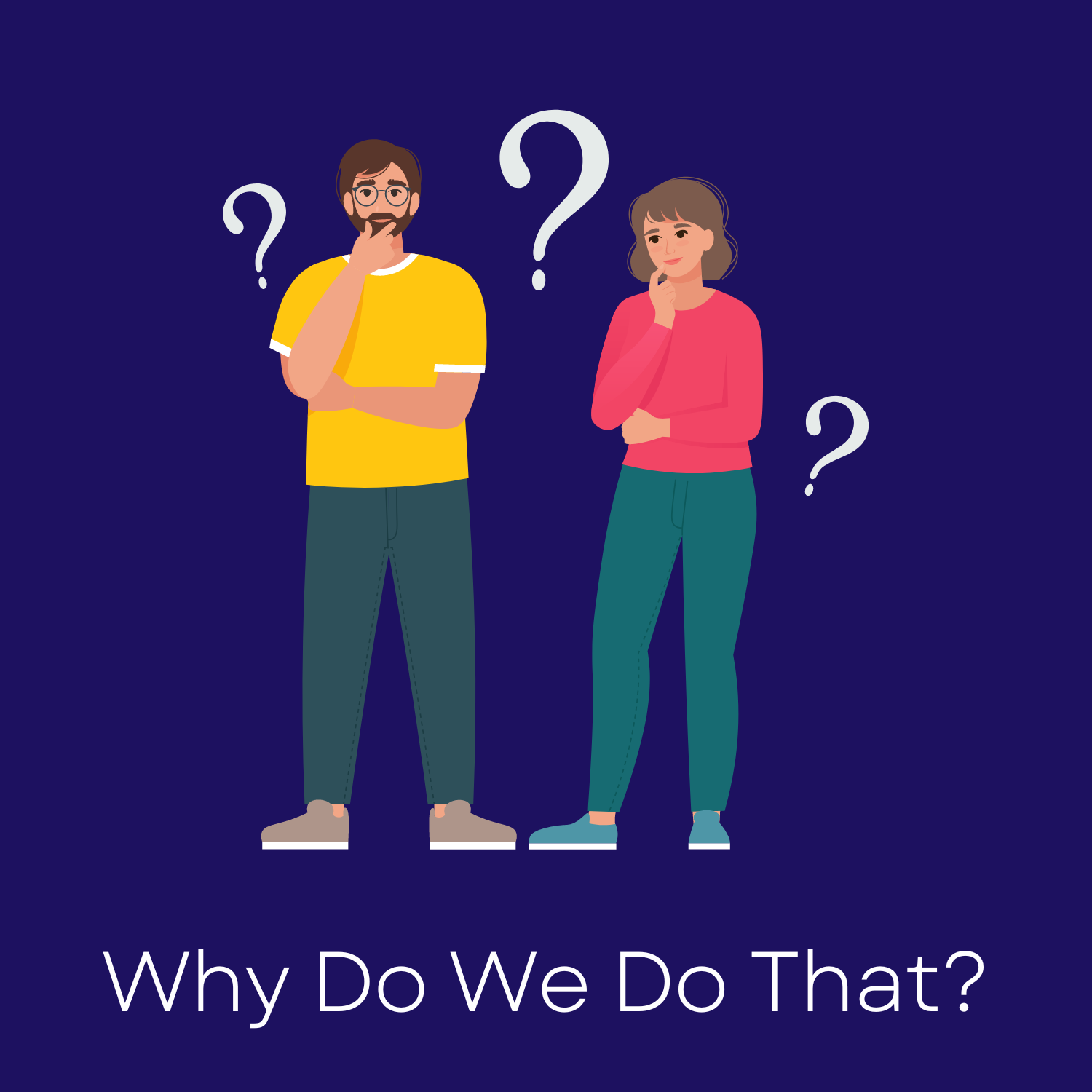 Why Do We Do That?#015 - Rational Thinking with Dr. Richard NisbettIn this episode of the podcast, Dr. Ryan Moyer speaks with social psychologist, Dr. Richard Nisbett about how poorly people are at explaining their own thoughts, how thinking has changed over the past century, what statistical principles can make you a better thinker, and cost-benefit analysis in the age of Covid-19.
For more on Richard, visit his website, where you can purchase his latest book "Thinking: A Memoir"
Why Do We Do That? is a psychology podcast that deconstructs human behavior from the perspectives of social scientists, psychologists, and others that use applied psychology in...2021-09-2055 min
Why Do We Do That?#015 - Rational Thinking with Dr. Richard NisbettIn this episode of the podcast, Dr. Ryan Moyer speaks with social psychologist, Dr. Richard Nisbett about how poorly people are at explaining their own thoughts, how thinking has changed over the past century, what statistical principles can make you a better thinker, and cost-benefit analysis in the age of Covid-19.
For more on Richard, visit his website, where you can purchase his latest book "Thinking: A Memoir"
Why Do We Do That? is a psychology podcast that deconstructs human behavior from the perspectives of social scientists, psychologists, and others that use applied psychology in...2021-09-2055 min Psychology After DarkInterview with Dr. Richard E. NisbettFrom a humble beginning in Littlefield, Texas, to Professor Emeritus at the University of Michigan Ann Arbor, Dr. Richard Nisbett has lived an extraordinary life as a widely influential social psychologist, the key points of which he explores in his new book, Thinking: A Memoir. In this interview, Dr. Nisbett talks about his contributions to psychological research including common thinking errors people make as it pertains to thinking rationally, and teaching people how to correct them; how Asian cultures think differently than Westerners; how Americans from the South think differently than those from the North, the importance of understanding base...2021-09-1359 min
Psychology After DarkInterview with Dr. Richard E. NisbettFrom a humble beginning in Littlefield, Texas, to Professor Emeritus at the University of Michigan Ann Arbor, Dr. Richard Nisbett has lived an extraordinary life as a widely influential social psychologist, the key points of which he explores in his new book, Thinking: A Memoir. In this interview, Dr. Nisbett talks about his contributions to psychological research including common thinking errors people make as it pertains to thinking rationally, and teaching people how to correct them; how Asian cultures think differently than Westerners; how Americans from the South think differently than those from the North, the importance of understanding base...2021-09-1359 min The Positive Head PodcastSoul-Share with Social Psychologist and Thinking Author, Richard NisbettRichard is a psychologist and author who focuses on issues in social psychology and cognitive science. In this episode, he discusses the reasoning processes people use to think about the world, how we can avoid errors in reasoning, and nature versus nurture. Download The Golden Key audio or e-book at GoldenKey.Gift with the Code: POSITIVEHEAD Care to play a game with the youniverse? positivehead.com/youniverse Text Brandon to receive regular golden nuggets of wisdom at 310.564.07502021-09-0958 min
The Positive Head PodcastSoul-Share with Social Psychologist and Thinking Author, Richard NisbettRichard is a psychologist and author who focuses on issues in social psychology and cognitive science. In this episode, he discusses the reasoning processes people use to think about the world, how we can avoid errors in reasoning, and nature versus nurture. Download The Golden Key audio or e-book at GoldenKey.Gift with the Code: POSITIVEHEAD Care to play a game with the youniverse? positivehead.com/youniverse Text Brandon to receive regular golden nuggets of wisdom at 310.564.07502021-09-0958 min Behavioral Grooves PodcastCan People Learn to be Better at Thinking? With Richard E. NisbettFew psychologists in the world have contributed more to scientific discovery than our guest Richard E. Nisbett. He joins us to discuss his latest book, the title of which embodies one of his favorite activities: Thinking: A Memoir. Thinking weaves Richard’s personal story through his research journey, painting a richer sense of the thought process behind his discoveries.
Richard E. Nisbett is the Theodore M. Newcomb Distinguished Professor of Social Psychology at the University of Michigan. Many of his previous books have been co-authored with his collaborator and friend, the late Lee Ross. The two first met...2021-08-291h 15
Behavioral Grooves PodcastCan People Learn to be Better at Thinking? With Richard E. NisbettFew psychologists in the world have contributed more to scientific discovery than our guest Richard E. Nisbett. He joins us to discuss his latest book, the title of which embodies one of his favorite activities: Thinking: A Memoir. Thinking weaves Richard’s personal story through his research journey, painting a richer sense of the thought process behind his discoveries.
Richard E. Nisbett is the Theodore M. Newcomb Distinguished Professor of Social Psychology at the University of Michigan. Many of his previous books have been co-authored with his collaborator and friend, the late Lee Ross. The two first met...2021-08-291h 15 Education Bookcast116a. Cultural Foundations of Learning, East and West by Jin LiYou may have noticed that I am generally quite disappointed in professors of education. It seems that the work of cognitive scientists, (some) psychologists, anthropologists, (some) economists, historians, and even machine learning researchers and philosophers is reliable, trustworthy, and can offer a good contribution, whereas that has not been my experience with people explicitly employed by university education departments. However, Jin Li breaks that trend. And boy, how she breaks it. Cultural Foundations of Learning, East and West follows Jin Li's research into the nature and causes of differences in learning beliefs, attitudes, and behaviours between Westerners...2021-08-0233 min
Education Bookcast116a. Cultural Foundations of Learning, East and West by Jin LiYou may have noticed that I am generally quite disappointed in professors of education. It seems that the work of cognitive scientists, (some) psychologists, anthropologists, (some) economists, historians, and even machine learning researchers and philosophers is reliable, trustworthy, and can offer a good contribution, whereas that has not been my experience with people explicitly employed by university education departments. However, Jin Li breaks that trend. And boy, how she breaks it. Cultural Foundations of Learning, East and West follows Jin Li's research into the nature and causes of differences in learning beliefs, attitudes, and behaviours between Westerners...2021-08-0233 min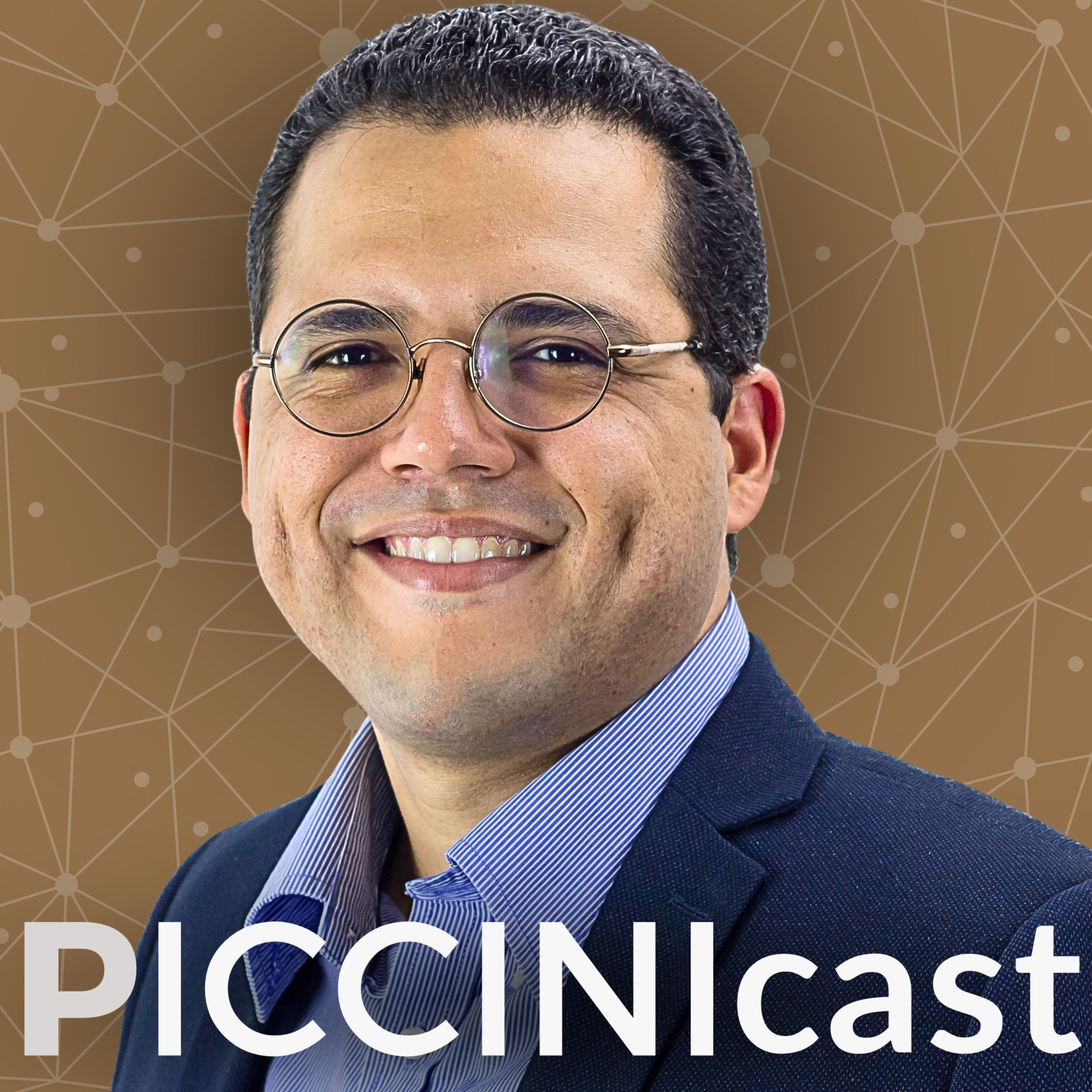 PicciniCastPIcciniCast 47 - Como Pensar Melhor e Com InteligênciaQuer pensar melhor e tomar melhores decisões? Confira as dicas neste PicciniCast para você pensar com mais clareza, decidir melhor e ter mais resultados na vida. Todas as estratégias deste episódio foram retiradas do livro Mindware do autor Richard Nisbett, adquira na amazon: https://amzn.to/2URA4x1
Mande suas críticas, elogios e sugestões para contato@estudareaprender.com
Se você quer passar em alguma prova, concurso ou faculdade em menos tempo, conheça o Método 5. Meu curso completo para ajudar você a desenvolver todas as potencialidades do seu cérebro e ter...2021-07-2831 min
PicciniCastPIcciniCast 47 - Como Pensar Melhor e Com InteligênciaQuer pensar melhor e tomar melhores decisões? Confira as dicas neste PicciniCast para você pensar com mais clareza, decidir melhor e ter mais resultados na vida. Todas as estratégias deste episódio foram retiradas do livro Mindware do autor Richard Nisbett, adquira na amazon: https://amzn.to/2URA4x1
Mande suas críticas, elogios e sugestões para contato@estudareaprender.com
Se você quer passar em alguma prova, concurso ou faculdade em menos tempo, conheça o Método 5. Meu curso completo para ajudar você a desenvolver todas as potencialidades do seu cérebro e ter...2021-07-2831 min Opinion Science#42: Thinking with Richard NisbettRichard E. Nisbett has spent his career studying how people think. He is an emeritus professor of Psychology at the University of Michigan, and his research has influenced how psychologists think about reasoning, introspection, culture, and intelligence. He has written several important books over his career, including The Geography of Thought: How Asians and Westerners Think Differently…and Why and Mindware: Tools for Smart Thinking.His newest book is Thinking: A Memoir.In this episode, Nisbett shares samples of his work relating to our inability to know the inner workings of our own mi...2021-07-1937 min
Opinion Science#42: Thinking with Richard NisbettRichard E. Nisbett has spent his career studying how people think. He is an emeritus professor of Psychology at the University of Michigan, and his research has influenced how psychologists think about reasoning, introspection, culture, and intelligence. He has written several important books over his career, including The Geography of Thought: How Asians and Westerners Think Differently…and Why and Mindware: Tools for Smart Thinking.His newest book is Thinking: A Memoir.In this episode, Nisbett shares samples of his work relating to our inability to know the inner workings of our own mi...2021-07-1937 min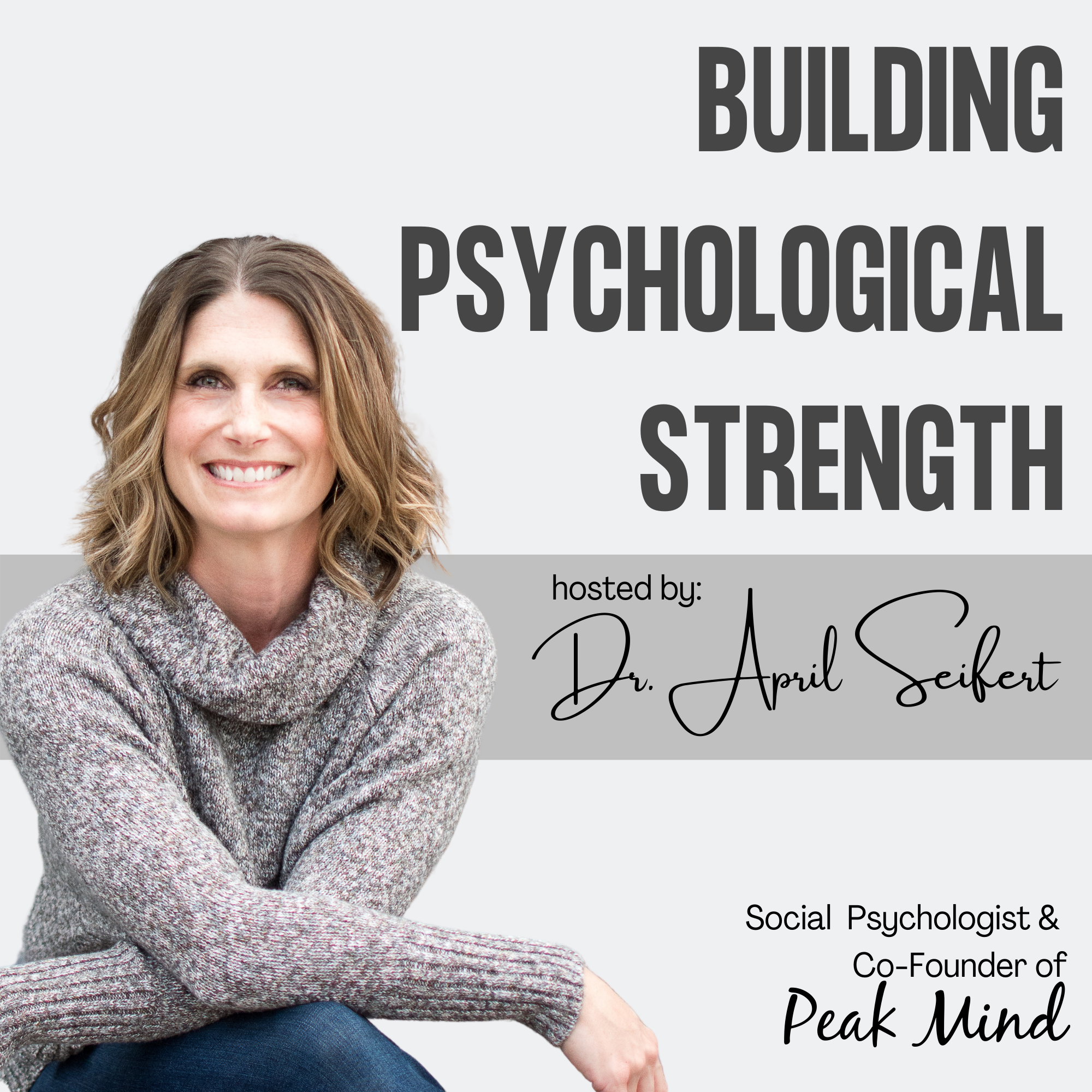 Building Psychological Strength0284 [LIFE] How to Heal Emotional Trauma with Cedric BertelliHow many times have you experienced a strong, negative emotion and acted in a way that you later regret? How many times have you experienced intense fear, anger, or anxiety, seemingly out of the blue? These experiences are what's called disruptive emotional patterns, and they can be changed. Today's guest is Cedric Bertelli, the founder of the Emotional Health Institute. Through is work, he helps people recognize and overcome disruptive emotional patterns that interfere with their lives. Through a process called Emotional Resolution or EmRes, he helps people retrain their mind to more accurately respond to day-to-day...2021-07-0746 min
Building Psychological Strength0284 [LIFE] How to Heal Emotional Trauma with Cedric BertelliHow many times have you experienced a strong, negative emotion and acted in a way that you later regret? How many times have you experienced intense fear, anger, or anxiety, seemingly out of the blue? These experiences are what's called disruptive emotional patterns, and they can be changed. Today's guest is Cedric Bertelli, the founder of the Emotional Health Institute. Through is work, he helps people recognize and overcome disruptive emotional patterns that interfere with their lives. Through a process called Emotional Resolution or EmRes, he helps people retrain their mind to more accurately respond to day-to-day...2021-07-0746 min Two Psychologists Four BeersHow (Not) to be a HaterAlexa and Yoel discuss "The Anticreativity Letters," a satirical article by Richard Nisbett that advises young psychology researchers to (among other things) avoid being overly critical. How does the article's advice hold up today? How does one combine appropriate skepticism with enthusiasm for research? Or are the two in conflict at all?
Plus: Alexa gets salty about salty drinks, and Yoel returns to the gym.Sponsored By:Paperpile: No-fuss reference management for the web. Manage your research library, right in your browser. Promo Code: BEERSLinks:The Anticreativity LettersCitrus Sage | Cascade BrewingLueur...2021-07-071h 24
Two Psychologists Four BeersHow (Not) to be a HaterAlexa and Yoel discuss "The Anticreativity Letters," a satirical article by Richard Nisbett that advises young psychology researchers to (among other things) avoid being overly critical. How does the article's advice hold up today? How does one combine appropriate skepticism with enthusiasm for research? Or are the two in conflict at all?
Plus: Alexa gets salty about salty drinks, and Yoel returns to the gym.Sponsored By:Paperpile: No-fuss reference management for the web. Manage your research library, right in your browser. Promo Code: BEERSLinks:The Anticreativity LettersCitrus Sage | Cascade BrewingLueur...2021-07-071h 24 Building Psychological Strength0281 [LIFE] How to Become a Better Thinker with Dr. Richard NisbettIn today's episode of the podcast, I had the pleasure of interviewing Dr. Richard Nisbett, one of the most well-known, well-cited, and influential Psychologists of all time. To say I am thrilled is an understatement! During our conversation, we dive deep into the meaningful contribution he has made to the field of Psychology. In particular, we touch on the difference between the unconscious and conscious mind and how we can use our unconscious mind more fully. We talk about errors and biases in our judgement and decision-making. And, he gives us a glimpse into the powerful factors...2021-06-3052 min
Building Psychological Strength0281 [LIFE] How to Become a Better Thinker with Dr. Richard NisbettIn today's episode of the podcast, I had the pleasure of interviewing Dr. Richard Nisbett, one of the most well-known, well-cited, and influential Psychologists of all time. To say I am thrilled is an understatement! During our conversation, we dive deep into the meaningful contribution he has made to the field of Psychology. In particular, we touch on the difference between the unconscious and conscious mind and how we can use our unconscious mind more fully. We talk about errors and biases in our judgement and decision-making. And, he gives us a glimpse into the powerful factors...2021-06-3052 min Standard Deviations with Dr. Daniel CrosbyRichard Nisbett - Does Introspection Matter? The Benefits of Self-Reflection in Personal GrowthTune in to hear:- On a previous podcast, Richard Nisbett expressed that the most central message of psychology is that we have no access to most of what goes on in our heads. What studies are illustrative of this dramatic conclusion he reached?- What are the implications of this stream of thought, particularly in regards to free will and determinism?- In light of this research, are things like introspection valuable or do they simply feel meaningful?- If environment is highly influential in our decision making process, what...2021-06-2449 min
Standard Deviations with Dr. Daniel CrosbyRichard Nisbett - Does Introspection Matter? The Benefits of Self-Reflection in Personal GrowthTune in to hear:- On a previous podcast, Richard Nisbett expressed that the most central message of psychology is that we have no access to most of what goes on in our heads. What studies are illustrative of this dramatic conclusion he reached?- What are the implications of this stream of thought, particularly in regards to free will and determinism?- In light of this research, are things like introspection valuable or do they simply feel meaningful?- If environment is highly influential in our decision making process, what...2021-06-2449 min Clearer Thinking with Spencer GreenbergConscious Processes and Intelligence (with Richard Nisbett)Read the full transcript here. What sorts of things do the conscious and unconscious parts of our minds do? How we can make people more intelligent? How much is intelligence heritable vs. environmental? What's the value (or disvalue) of holding interviews during the hiring process? When do we over- and under-use cost-benefit analyses?Richard E. Nisbett is one of the world's most respected psychologists. His work focuses on issues in social psychology and cognitive science. His newest book Thinking: A Memoir is both an intellectual autobiography and a personal history. It's available for sale on...2021-06-201h 15
Clearer Thinking with Spencer GreenbergConscious Processes and Intelligence (with Richard Nisbett)Read the full transcript here. What sorts of things do the conscious and unconscious parts of our minds do? How we can make people more intelligent? How much is intelligence heritable vs. environmental? What's the value (or disvalue) of holding interviews during the hiring process? When do we over- and under-use cost-benefit analyses?Richard E. Nisbett is one of the world's most respected psychologists. His work focuses on issues in social psychology and cognitive science. His newest book Thinking: A Memoir is both an intellectual autobiography and a personal history. It's available for sale on...2021-06-201h 15 BedletterGuest: Western vs. Eastern Thought & Book Motivations w/ Richard NisbettThis is the fourth and final part of Richard and Christian’s conversation where they discuss the differences in Western versus Eastern thought and Richard’s motivations behind writing his book. Richard recently released his new book Thinking: A Memoir, in which he details different human reasoning errors, why those errors occur, and how to improve your reasoning. Episode 48.Find out more at bedletter.substack.comThinking: A Memoir by Richard Nisbett on AmazonFollow Christian on Twitter @cashlimanSupport the show (https://bedletter.subs...2021-06-1518 min
BedletterGuest: Western vs. Eastern Thought & Book Motivations w/ Richard NisbettThis is the fourth and final part of Richard and Christian’s conversation where they discuss the differences in Western versus Eastern thought and Richard’s motivations behind writing his book. Richard recently released his new book Thinking: A Memoir, in which he details different human reasoning errors, why those errors occur, and how to improve your reasoning. Episode 48.Find out more at bedletter.substack.comThinking: A Memoir by Richard Nisbett on AmazonFollow Christian on Twitter @cashlimanSupport the show (https://bedletter.subs...2021-06-1518 min The Human Behavior Podcast#125: Thinking; with Dr. Richard NisbettSend us a textToday we are joined by social psychologist Dr. Richard Nisbett to discuss his latest book called “Thinking: A Memoir.” Dr Nisbett has spent his career researching things like how people reason, how people should reason, why errors in reasoning occur, how much you can improve reasoning, what kinds of problems are best solved by the conscious mind and what kinds by the unconscious mind. We get into a number of different areas during the episode including Eastern vs Western thinking, Jukebox Theory, and one of the most prevalent issues I see happe...2021-06-091h 07
The Human Behavior Podcast#125: Thinking; with Dr. Richard NisbettSend us a textToday we are joined by social psychologist Dr. Richard Nisbett to discuss his latest book called “Thinking: A Memoir.” Dr Nisbett has spent his career researching things like how people reason, how people should reason, why errors in reasoning occur, how much you can improve reasoning, what kinds of problems are best solved by the conscious mind and what kinds by the unconscious mind. We get into a number of different areas during the episode including Eastern vs Western thinking, Jukebox Theory, and one of the most prevalent issues I see happe...2021-06-091h 07 BedletterGuest: The Power of the Unconscious Mind & the Law of Large Numbers w/ Richard NisbettToday is the third part of Richard and Christian’s conversation where they discuss the power of the unconscious mind, the law of large numbers, and how learning these concepts can change everything. Richard recently released his new book Thinking: A Memoir, in which he details different human reasoning errors, why those errors occur, and how to improve your reasoning. Episode 46.Find out more at bedletter.substack.comThinking: A Memoir by Richard Nisbett on AmazonFollow Christian on Twitter @cashlimanSupport the show (ht...2021-06-0820 min
BedletterGuest: The Power of the Unconscious Mind & the Law of Large Numbers w/ Richard NisbettToday is the third part of Richard and Christian’s conversation where they discuss the power of the unconscious mind, the law of large numbers, and how learning these concepts can change everything. Richard recently released his new book Thinking: A Memoir, in which he details different human reasoning errors, why those errors occur, and how to improve your reasoning. Episode 46.Find out more at bedletter.substack.comThinking: A Memoir by Richard Nisbett on AmazonFollow Christian on Twitter @cashlimanSupport the show (ht...2021-06-0820 min BedletterGuest: Research Replication & the Fundamental Attribution Error w/ Richard NisbettContinuing the conversation with Richard E. Nisbett! Richard recently released his new book Thinking: A Memoir, in which he details different human reasoning errors, why those errors occur, and how to improve your reasoning. Today is the second part of Richard and Christian's conversation where they discuss the replicability of psychological research and the Fundamental Attribution Error. Episode 44. Find out more at bedletter.substack.comThinking: A Memoir by Richard Nisbett on AmazonFollow Christian on Twitter @cashlimanSupport the show (https://bedletter.substack...2021-06-0115 min
BedletterGuest: Research Replication & the Fundamental Attribution Error w/ Richard NisbettContinuing the conversation with Richard E. Nisbett! Richard recently released his new book Thinking: A Memoir, in which he details different human reasoning errors, why those errors occur, and how to improve your reasoning. Today is the second part of Richard and Christian's conversation where they discuss the replicability of psychological research and the Fundamental Attribution Error. Episode 44. Find out more at bedletter.substack.comThinking: A Memoir by Richard Nisbett on AmazonFollow Christian on Twitter @cashlimanSupport the show (https://bedletter.substack...2021-06-0115 min BedletterReasoning Errors Run DeepIn the inaugural episode of 5-Minute Fridays, Christian discusses the relationship between reasoning errors detailed in the book Thinking: A Memoir by Richard Nisbett and the class distinctions and group inferences reviewed in The Road to Wigan Pier by George Orwell. Episode 43.Find out more at cashliman.comThinking: A Memoir by Richard Nisbett on AmazonFollow Bedletter on Instagram @cashlimanSupport the show (https://bedletter.substack.com/welcome) Get full access to Bedletter at bedletter.substack.com/subscribe2021-05-2808 min
BedletterReasoning Errors Run DeepIn the inaugural episode of 5-Minute Fridays, Christian discusses the relationship between reasoning errors detailed in the book Thinking: A Memoir by Richard Nisbett and the class distinctions and group inferences reviewed in The Road to Wigan Pier by George Orwell. Episode 43.Find out more at cashliman.comThinking: A Memoir by Richard Nisbett on AmazonFollow Bedletter on Instagram @cashlimanSupport the show (https://bedletter.substack.com/welcome) Get full access to Bedletter at bedletter.substack.com/subscribe2021-05-2808 min BedletterGuest: Reasoning Errors & Mentor Relationships w/ Richard NisbettThis week we welcome accomplished psychologist Richard E. Nisbett to the show! Richard recently released his new book Thinking: A Memoir, in which he details different human reasoning errors, why those errors occur, and how to improve your reasoning. Today is the first part of Richard and Christian's conversation where they discuss Richard’s interest in reasoning errors and how a mentor relationship can benefit your growth. Episode 42. Find out more at bedletter.substack.comThinking: A Memoir by Richard Nisbett on AmazonFollow Christian on Twitter @ca...2021-05-2518 min
BedletterGuest: Reasoning Errors & Mentor Relationships w/ Richard NisbettThis week we welcome accomplished psychologist Richard E. Nisbett to the show! Richard recently released his new book Thinking: A Memoir, in which he details different human reasoning errors, why those errors occur, and how to improve your reasoning. Today is the first part of Richard and Christian's conversation where they discuss Richard’s interest in reasoning errors and how a mentor relationship can benefit your growth. Episode 42. Find out more at bedletter.substack.comThinking: A Memoir by Richard Nisbett on AmazonFollow Christian on Twitter @ca...2021-05-2518 min consideranew (+ Season 2 cohost, Dr. Jane Shore of School of Thought)Season 1: Episode 9 - Lee Ross + Richard Nisbett: Context is key"The Person and the Situation: Perspectives of Social Psychology" by Lee Ross and Richard Nisbett (2011) (http://bit.ly/2XSlkvP)"An interpretation of the false consensus effect in terms of construal, it should be reemphasized, requires more than the simple assumption that different people construe a given situation in different ways. It depends on the additional assumption that in doing so they fail to recognize or fail to make adequate inferential allowance for the fact that their peers may construe the 'same' situation quite differently. The contention here is that people fail to recognize the degree to which...2021-01-1807 min
consideranew (+ Season 2 cohost, Dr. Jane Shore of School of Thought)Season 1: Episode 9 - Lee Ross + Richard Nisbett: Context is key"The Person and the Situation: Perspectives of Social Psychology" by Lee Ross and Richard Nisbett (2011) (http://bit.ly/2XSlkvP)"An interpretation of the false consensus effect in terms of construal, it should be reemphasized, requires more than the simple assumption that different people construe a given situation in different ways. It depends on the additional assumption that in doing so they fail to recognize or fail to make adequate inferential allowance for the fact that their peers may construe the 'same' situation quite differently. The contention here is that people fail to recognize the degree to which...2021-01-1807 min Podcast#42: Richard Nisbett on Telling More Than He Can KnowRichard Nisbett is the Theodore M. Newcomb Distinguished Professor of social psychology and co-director of the Culture and Cognition program at the University of Michigan at Ann Arbor. He is also the co-author of one of my favorite psychology papers of all time: "Telling More than We Can Know." In this conversation, Richard self-reports on what got him into psychology, the books that most impacted him, the influence of his mentor Stanley Schachter, and his best practices for collaboration and mentorship. Those self reports sure seem accurate, though I'm not sure either of us is in an especially good position...2021-01-051h 43
Podcast#42: Richard Nisbett on Telling More Than He Can KnowRichard Nisbett is the Theodore M. Newcomb Distinguished Professor of social psychology and co-director of the Culture and Cognition program at the University of Michigan at Ann Arbor. He is also the co-author of one of my favorite psychology papers of all time: "Telling More than We Can Know." In this conversation, Richard self-reports on what got him into psychology, the books that most impacted him, the influence of his mentor Stanley Schachter, and his best practices for collaboration and mentorship. Those self reports sure seem accurate, though I'm not sure either of us is in an especially good position...2021-01-051h 43 Cognitive Revolution#42: Richard Nisbett on Telling More Than He Can KnowRichard Nisbett is the Theodore M. Newcomb Distinguished Professor of social psychology and co-director of the Culture and Cognition program at the University of Michigan at Ann Arbor. He is also the co-author of one of my favorite psychology papers of all time: "Telling More than We Can Know." In this conversation, Richard self-reports on what got him into psychology, the books that most impacted him, the influence of his mentor Stanley Schachter, and his best practices for collaboration and mentorship. Those self reports sure seem accurate, though I'm not sure either of us is in an especially good position...2021-01-051h 43
Cognitive Revolution#42: Richard Nisbett on Telling More Than He Can KnowRichard Nisbett is the Theodore M. Newcomb Distinguished Professor of social psychology and co-director of the Culture and Cognition program at the University of Michigan at Ann Arbor. He is also the co-author of one of my favorite psychology papers of all time: "Telling More than We Can Know." In this conversation, Richard self-reports on what got him into psychology, the books that most impacted him, the influence of his mentor Stanley Schachter, and his best practices for collaboration and mentorship. Those self reports sure seem accurate, though I'm not sure either of us is in an especially good position...2021-01-051h 43 You Probably Shouldn't Read ThisEp 35: Why Wearing Glasses Makes You SmarterI think identity plays a much bigger part in change than I thought, on a personal and societal level. Today I’m talking about people, tomorrow I’ll talk about society.Identity is basically a magical thing which allows us to derive joy and energy in arbitrary things.When you do something that falls within your identity, you'll find meaning in it, independent of its difficulty or outcome.I started running when I was 15 not because I liked it— nobody likes running when they start. I started because someone told me I was good...2020-08-2905 min
You Probably Shouldn't Read ThisEp 35: Why Wearing Glasses Makes You SmarterI think identity plays a much bigger part in change than I thought, on a personal and societal level. Today I’m talking about people, tomorrow I’ll talk about society.Identity is basically a magical thing which allows us to derive joy and energy in arbitrary things.When you do something that falls within your identity, you'll find meaning in it, independent of its difficulty or outcome.I started running when I was 15 not because I liked it— nobody likes running when they start. I started because someone told me I was good...2020-08-2905 min The Keith Law ShowSmart Thinking w/Dr. Richard NisbettRundown2:55 How Humans Are Profligate Causal Theorists4:44 Unconscious Influences9:28 Reasoning By Schemas11:20 Can Schemas Be Helpful & Unhelpful?14:10 The Thinkability Heuristic16:51 When Is Cost-Benefit Analysis Appropriate?19:53 When Cost-Benefit Analysis Runs Into Moral ConsiderationsFollow Keith on Twitter: @keithlawGet 40% off of a subscription to The Athletic at theathletic.com/klawInterested in Dr. Nisbett's book? Purchase 'Mindware: Tools for Smart Thinking' at bookshop.org. Hosted on Acast. See acast.com/privacy for more information.2020-07-0625 min
The Keith Law ShowSmart Thinking w/Dr. Richard NisbettRundown2:55 How Humans Are Profligate Causal Theorists4:44 Unconscious Influences9:28 Reasoning By Schemas11:20 Can Schemas Be Helpful & Unhelpful?14:10 The Thinkability Heuristic16:51 When Is Cost-Benefit Analysis Appropriate?19:53 When Cost-Benefit Analysis Runs Into Moral ConsiderationsFollow Keith on Twitter: @keithlawGet 40% off of a subscription to The Athletic at theathletic.com/klawInterested in Dr. Nisbett's book? Purchase 'Mindware: Tools for Smart Thinking' at bookshop.org. Hosted on Acast. See acast.com/privacy for more information.2020-07-0625 min Behavioral Grooves PodcastJohn Bargh: Dante, Coffee and the Unconscious MindJohn Bargh, PhD is a Professor of Psychology and Management at Yale University. His name may be familiar because of the replication crisis, but there is so much more to John Bargh than a couple of experiments that were challenged during replication. John has authored more than 100 peer-reviewed articles, chapters in over 30 books, and he founded The ACME lab at Yale in order to research the unconscious and implicit influences on social judgment, motivation, and behavior.
Over the years, his research has focused on embodied cognition effects, or how physical experiences (such as washing one’s hands or...2020-06-141h 32
Behavioral Grooves PodcastJohn Bargh: Dante, Coffee and the Unconscious MindJohn Bargh, PhD is a Professor of Psychology and Management at Yale University. His name may be familiar because of the replication crisis, but there is so much more to John Bargh than a couple of experiments that were challenged during replication. John has authored more than 100 peer-reviewed articles, chapters in over 30 books, and he founded The ACME lab at Yale in order to research the unconscious and implicit influences on social judgment, motivation, and behavior.
Over the years, his research has focused on embodied cognition effects, or how physical experiences (such as washing one’s hands or...2020-06-141h 32 Man of Steel Answers Insight Commentary66 – East[Recorded August 8, 2019] Learning from Eastern thought. Seeing much more detail and connection. Comparing high and low context communication. How Superman's silence can be seen as sophisticated. The Problem of Evil in the East. Harmonizing Batman and Superman.
Based on the research of Dr. Richard E. Nisbett and his book, "The Geography of Thought: How Asians and Westerners Think Differently"
Donate or MOSAIC T-Shirt
Answers, insights, and commentary on:
East Asians less inclined towards Fundamental Attribution Error (00:04:40)
Dr. Richard E. Nisbett (00:07:40)
Objects vs. Context (00:17:45)
Nouns vs. Verbs (00:18:30)
Facial Expression (00:25:11)
Michigan Fish Test (00:32:44)
High & Low Context (00:36:17)
Superman's Silence (00:48:37)
Thinking and Speaking (00:51:03)
Counter-Intuitive...2019-08-242h 35
Man of Steel Answers Insight Commentary66 – East[Recorded August 8, 2019] Learning from Eastern thought. Seeing much more detail and connection. Comparing high and low context communication. How Superman's silence can be seen as sophisticated. The Problem of Evil in the East. Harmonizing Batman and Superman.
Based on the research of Dr. Richard E. Nisbett and his book, "The Geography of Thought: How Asians and Westerners Think Differently"
Donate or MOSAIC T-Shirt
Answers, insights, and commentary on:
East Asians less inclined towards Fundamental Attribution Error (00:04:40)
Dr. Richard E. Nisbett (00:07:40)
Objects vs. Context (00:17:45)
Nouns vs. Verbs (00:18:30)
Facial Expression (00:25:11)
Michigan Fish Test (00:32:44)
High & Low Context (00:36:17)
Superman's Silence (00:48:37)
Thinking and Speaking (00:51:03)
Counter-Intuitive...2019-08-242h 35 Man of Steel Answers Insight Commentary66 – East[Recorded August 8, 2019] Learning from Eastern thought. Seeing much more detail and connection. Comparing high and low context communication. How Superman's silence can be seen as sophisticated. The Problem of Evil in the East. Harmonizing Batman and Superman.
Based on the research of Dr. Richard E. Nisbett and his book, "The Geography of Thought: How Asians and Westerners Think Differently"
Donate or MOSAIC T-Shirt
Answers, insights, and commentary on:
East Asians less inclined towards Fundamental Attribution Error (00:04:40)
Dr. Richard E. Nisbett (00:07:40)
Objects vs. Context (00:17:45)
Nouns vs. Verbs (00:18:30)
Facial Expression (00:25:11)
Michigan Fish Test (00:32:44)
High & Low Context (00:36:17)
Superman's Silence (00:48:37)
Thinking and Speaking (00:51:03)
Counter-Intuitive...2019-08-242h 35
Man of Steel Answers Insight Commentary66 – East[Recorded August 8, 2019] Learning from Eastern thought. Seeing much more detail and connection. Comparing high and low context communication. How Superman's silence can be seen as sophisticated. The Problem of Evil in the East. Harmonizing Batman and Superman.
Based on the research of Dr. Richard E. Nisbett and his book, "The Geography of Thought: How Asians and Westerners Think Differently"
Donate or MOSAIC T-Shirt
Answers, insights, and commentary on:
East Asians less inclined towards Fundamental Attribution Error (00:04:40)
Dr. Richard E. Nisbett (00:07:40)
Objects vs. Context (00:17:45)
Nouns vs. Verbs (00:18:30)
Facial Expression (00:25:11)
Michigan Fish Test (00:32:44)
High & Low Context (00:36:17)
Superman's Silence (00:48:37)
Thinking and Speaking (00:51:03)
Counter-Intuitive...2019-08-242h 35 Man of Steel Answers Insight Commentary66 – East[Recorded August 8, 2019] Learning from Eastern thought. Seeing much more detail and connection. Comparing high and low context communication. How Superman’s silence can be seen as sophisticated. The Problem of Evil in the East. Harmonizing Batman and Superman.
Based on the research of Dr. Richard E. Nisbett and his book, “The Geography of Thought: How Asians and Westerners Think Differently“
Donate or MOSAIC T-Shirt
Answers, insights, and commentary on:
East Asians less inclined towards Fundamental Attribution Error (00:04:40)
Dr. Richard E. Nisbett (00:07:40)
Objects vs. Context (00:17:45)
Nouns vs. Verbs (00:18:30)
Facial Expression (00:25:11)
Michigan Fish Test (00:32:44)
High...2019-08-242h 35
Man of Steel Answers Insight Commentary66 – East[Recorded August 8, 2019] Learning from Eastern thought. Seeing much more detail and connection. Comparing high and low context communication. How Superman’s silence can be seen as sophisticated. The Problem of Evil in the East. Harmonizing Batman and Superman.
Based on the research of Dr. Richard E. Nisbett and his book, “The Geography of Thought: How Asians and Westerners Think Differently“
Donate or MOSAIC T-Shirt
Answers, insights, and commentary on:
East Asians less inclined towards Fundamental Attribution Error (00:04:40)
Dr. Richard E. Nisbett (00:07:40)
Objects vs. Context (00:17:45)
Nouns vs. Verbs (00:18:30)
Facial Expression (00:25:11)
Michigan Fish Test (00:32:44)
High...2019-08-242h 35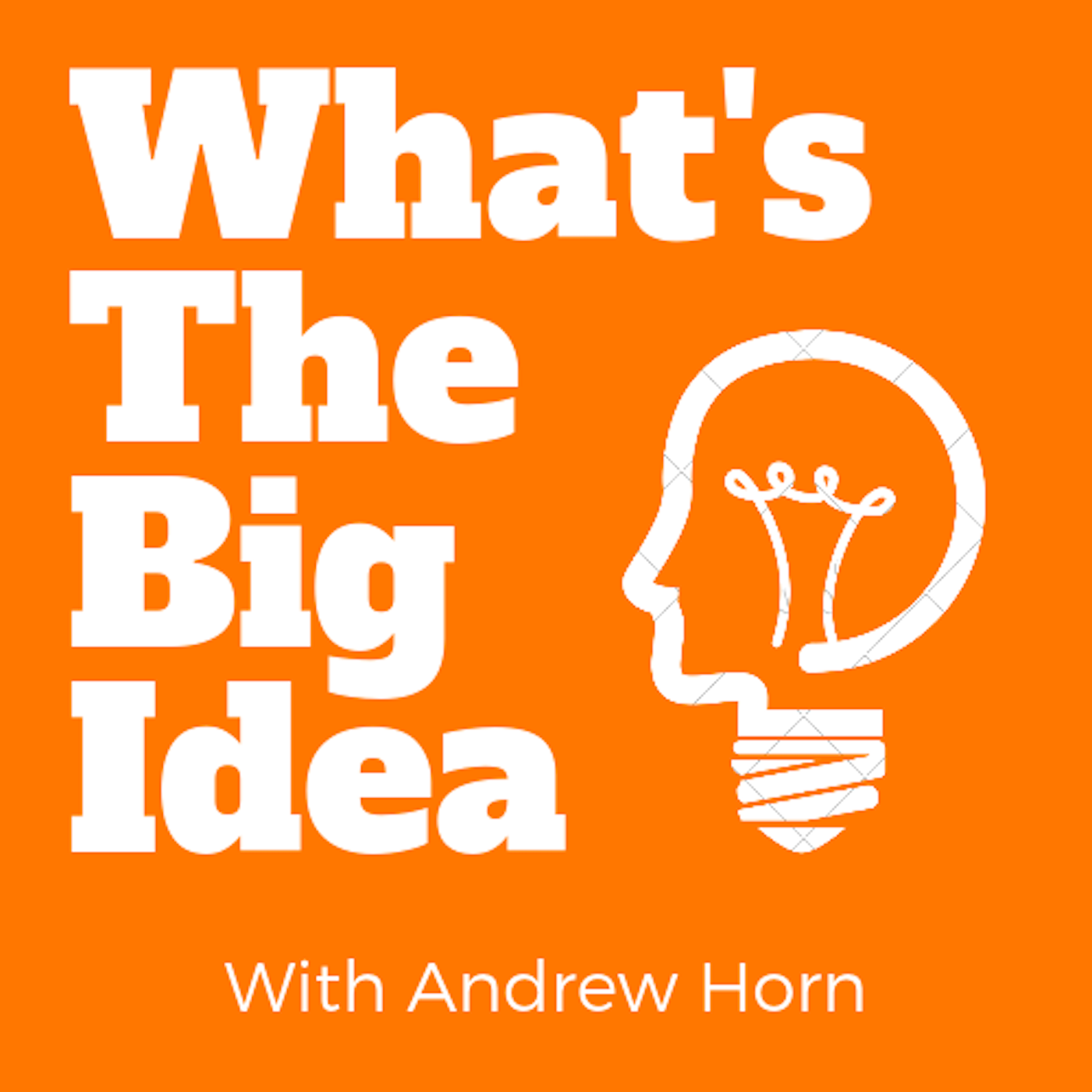 What's the Big Idea with Andrew HornTom Gilovich - The Power of Investing in Experiences vs. Material PossessionsThomas Gilovich is the Irene Blecker Rosenfeld Professor of Psychology at Cornell University and co-director of the Cornell Center for Behavioral Economics and Decision Research. He specializes in the study of everyday judgment and reasoning, psychological well-being, and self-assessment. In addition to his articles in scientific journals, Dr. Gilovich is the author of How We Know What Isn’t So (Free Press), Why Smart People Make Big Money Mistakes (Simon and Schuster, with Gary Belsky), Social Psychology (W.W. Norton, with Dacher Keltner, Serena Chen, and Richard Nisbett), and The Wisest One in the Room (The Free Press, with Le...2019-05-2052 min
What's the Big Idea with Andrew HornTom Gilovich - The Power of Investing in Experiences vs. Material PossessionsThomas Gilovich is the Irene Blecker Rosenfeld Professor of Psychology at Cornell University and co-director of the Cornell Center for Behavioral Economics and Decision Research. He specializes in the study of everyday judgment and reasoning, psychological well-being, and self-assessment. In addition to his articles in scientific journals, Dr. Gilovich is the author of How We Know What Isn’t So (Free Press), Why Smart People Make Big Money Mistakes (Simon and Schuster, with Gary Belsky), Social Psychology (W.W. Norton, with Dacher Keltner, Serena Chen, and Richard Nisbett), and The Wisest One in the Room (The Free Press, with Le...2019-05-2052 min Control ABook Mindware by Richard Nisbett book summary in hindiMany scientific and philosophical ideas are so powerful that they can be applied to our lives to help us think smarter and more effectively about our behaviour and the world around us. Surprisingly, many of these ideas remain unknown to most of us. Drawing on his own groundbreaking research, Richard Nisbett presents these ideas in clear and accessible detail to offer a tool kit for better thinking and wiser decisions. Mindware shows how to reframe common problems - whether professional, business, or personal - in such a way that these powerful scientific and statistical concepts can be applied to them.2018-12-1817 min
Control ABook Mindware by Richard Nisbett book summary in hindiMany scientific and philosophical ideas are so powerful that they can be applied to our lives to help us think smarter and more effectively about our behaviour and the world around us. Surprisingly, many of these ideas remain unknown to most of us. Drawing on his own groundbreaking research, Richard Nisbett presents these ideas in clear and accessible detail to offer a tool kit for better thinking and wiser decisions. Mindware shows how to reframe common problems - whether professional, business, or personal - in such a way that these powerful scientific and statistical concepts can be applied to them.2018-12-1817 min A for Effort15 L for Late, Sticky NightIn which Harry and Mairead discuss technological surveillance and social psychology.
For more on social psychology, Mairead recommends the book The Person and the Situation by Lee Ross and Richard Nisbett.
For more on technological surveillance, Harry recommends the most recent technology quarterly from The Economist.
Our music is “Chop Shop (Instrumental)” by White Flowers, and our logo is by ei8htz.2018-06-0700 min
A for Effort15 L for Late, Sticky NightIn which Harry and Mairead discuss technological surveillance and social psychology.
For more on social psychology, Mairead recommends the book The Person and the Situation by Lee Ross and Richard Nisbett.
For more on technological surveillance, Harry recommends the most recent technology quarterly from The Economist.
Our music is “Chop Shop (Instrumental)” by White Flowers, and our logo is by ei8htz.2018-06-0700 min The Black GoatCreativity and RigorIn this episode we explore the relationship between creativity and rigor. Some psychologists have commented that they at odds, others have suggested that you can pursue one independent of the other. We examine the argument that expecting research to be rigorous gets in the way of creativity. What makes a scientific idea creative, and how is that different from creativity in other domains? Can people be creative in the ways they try to be rigorous? Are creative ideas more prestigious than rigorous methods? Have cheap ideas given a bad name to scientific creativity, and have bad criticisms given a bad name to...2018-01-241h 06
The Black GoatCreativity and RigorIn this episode we explore the relationship between creativity and rigor. Some psychologists have commented that they at odds, others have suggested that you can pursue one independent of the other. We examine the argument that expecting research to be rigorous gets in the way of creativity. What makes a scientific idea creative, and how is that different from creativity in other domains? Can people be creative in the ways they try to be rigorous? Are creative ideas more prestigious than rigorous methods? Have cheap ideas given a bad name to scientific creativity, and have bad criticisms given a bad name to...2018-01-241h 06 The Black GoatCreativity and RigorIn this episode we explore the relationship between creativity and rigor. Some psychologists have commented that they at odds, others have suggested that you can pursue one independent of the other. We examine the argument that expecting research to be rigorous gets in the way of creativity. What makes a scientific idea creative, and how is that different from creativity in other domains? Can people be creative in the ways they try to be rigorous? Are creative ideas more prestigious than rigorous methods? Have cheap ideas given a bad name to scientific creativity, and have bad criticisms given a bad name...2018-01-241h 06
The Black GoatCreativity and RigorIn this episode we explore the relationship between creativity and rigor. Some psychologists have commented that they at odds, others have suggested that you can pursue one independent of the other. We examine the argument that expecting research to be rigorous gets in the way of creativity. What makes a scientific idea creative, and how is that different from creativity in other domains? Can people be creative in the ways they try to be rigorous? Are creative ideas more prestigious than rigorous methods? Have cheap ideas given a bad name to scientific creativity, and have bad criticisms given a bad name...2018-01-241h 06 The Good Intentions PodcastEpisode 003 | Hunter Maats
Hunter Maats talks with Dave Rael about education, perspective, science, reason, persuasion, and fundamentalism
Chapters:
0:52 - Hunter's background and story5:43 - Resources and resourcefulness10:30 - Thinking and feeling are always linked15:21 - The Straight-A Conspiracy, Mindset, and practical learning21:56 - Aristocrats, eugenics, and Intelligence Quotient25:40 - IQ research, the blind men and the elephant, and sectarian differences35:01 - The relevance of "redneck culture"42:20 - The meaning of "Mixed Mental Arts"49:59 - Managing anger, engaging people with difficult perspectives, and challenging people53:30 - Fundamentalism60:47 - Identification of fundamentalists71:58 - The difference between the message sent and the message received75:21...2017-08-2100 min
The Good Intentions PodcastEpisode 003 | Hunter Maats
Hunter Maats talks with Dave Rael about education, perspective, science, reason, persuasion, and fundamentalism
Chapters:
0:52 - Hunter's background and story5:43 - Resources and resourcefulness10:30 - Thinking and feeling are always linked15:21 - The Straight-A Conspiracy, Mindset, and practical learning21:56 - Aristocrats, eugenics, and Intelligence Quotient25:40 - IQ research, the blind men and the elephant, and sectarian differences35:01 - The relevance of "redneck culture"42:20 - The meaning of "Mixed Mental Arts"49:59 - Managing anger, engaging people with difficult perspectives, and challenging people53:30 - Fundamentalism60:47 - Identification of fundamentalists71:58 - The difference between the message sent and the message received75:21...2017-08-2100 min Travel Wisdom Podcast -travel and learn languages for success and moneyRichard Nisbett on how how culture determines our outcomeRichard Nisbett is the author of 3 books which deal with the psychology of thought. His first book was about the differences between Eastern and Western ways of thinking. Eastern is more holistic and Western is more atomistic meaning that the ways they perceive things are completely different as well. His second book was about the different culture in the North versus the Southern United States and what that meant for outcomes. Finally, his last book is about we can learn better 2017-06-141h 02
Travel Wisdom Podcast -travel and learn languages for success and moneyRichard Nisbett on how how culture determines our outcomeRichard Nisbett is the author of 3 books which deal with the psychology of thought. His first book was about the differences between Eastern and Western ways of thinking. Eastern is more holistic and Western is more atomistic meaning that the ways they perceive things are completely different as well. His second book was about the different culture in the North versus the Southern United States and what that meant for outcomes. Finally, his last book is about we can learn better 2017-06-141h 02 Ri Science PodcastThe Psychology of Thinking - Richard NisbettIn a lightning tour of human reasoning, world-renowned psychologist Richard Nisbett shines a new light on the shadowy world of the way we think – and how we can make our lives, and the lives of those around us, better.
Subscribe to the podcast via your podcasting app for free: Just search 'Ri Science Podcast'.
Richard Nisbett is Theodore M. Newcomb Distinguished Professor of social psychology and co-director of the Culture and Cognition program at the University of Michigan at Ann Arbor.
"The most influential thinker, in my life, has been the psychologist Richard Nisbett. He basically gave me my view of...2017-05-0256 min
Ri Science PodcastThe Psychology of Thinking - Richard NisbettIn a lightning tour of human reasoning, world-renowned psychologist Richard Nisbett shines a new light on the shadowy world of the way we think – and how we can make our lives, and the lives of those around us, better.
Subscribe to the podcast via your podcasting app for free: Just search 'Ri Science Podcast'.
Richard Nisbett is Theodore M. Newcomb Distinguished Professor of social psychology and co-director of the Culture and Cognition program at the University of Michigan at Ann Arbor.
"The most influential thinker, in my life, has been the psychologist Richard Nisbett. He basically gave me my view of...2017-05-0256 min Education Bookcast39b. The Geography of Thought by Richard Nisbett [continued]This continues the episode about The Geography of Thought, looking at more ways in which the cultural differences manifest themselves in differing psychologies of people from different parts of the world. Themes include: Visual perception; Descriptions and understandings of the self; Attitudes to choice; "Fitting in" versus uniqueness; Attitudes to the law and contractual agreements; Factors affecting motivation; Preference for different types of reasoning; and Approaches to blame and causality. I also answer some questions posed at the beginning of last episode, namely: Why do modern Asians excel at science and maths, and yet have few...2017-04-081h 13
Education Bookcast39b. The Geography of Thought by Richard Nisbett [continued]This continues the episode about The Geography of Thought, looking at more ways in which the cultural differences manifest themselves in differing psychologies of people from different parts of the world. Themes include: Visual perception; Descriptions and understandings of the self; Attitudes to choice; "Fitting in" versus uniqueness; Attitudes to the law and contractual agreements; Factors affecting motivation; Preference for different types of reasoning; and Approaches to blame and causality. I also answer some questions posed at the beginning of last episode, namely: Why do modern Asians excel at science and maths, and yet have few...2017-04-081h 13 Education Bookcast39a. The Geography of Thought by Richard NisbettUnlike many books that I cover, this is one that I read recently and felt an urgent need to share its contents even before I got to the appropriate theme in a series of episodes. It hit me right where it hurts - in my fundamental assumptions about human nature. As I research the field of education and produce this podcast, I have been generally assuming that people are more or less the same everywhere in their fundamental modes of thinking and feeling. I presumed that the topic of motivation, for example, or that of cognitive biases...2017-03-051h 15
Education Bookcast39a. The Geography of Thought by Richard NisbettUnlike many books that I cover, this is one that I read recently and felt an urgent need to share its contents even before I got to the appropriate theme in a series of episodes. It hit me right where it hurts - in my fundamental assumptions about human nature. As I research the field of education and produce this podcast, I have been generally assuming that people are more or less the same everywhere in their fundamental modes of thinking and feeling. I presumed that the topic of motivation, for example, or that of cognitive biases...2017-03-051h 15 The Science of SuccessMaking Better Decisions, The Sophomore Jinx, & The Illusion of Objectivity with Dr. Richard NisbettIn this episode we discuss the errors people make in their reasoning and how to correct them, we explain a number of statistical principles to help sharpen your thinking and make you a better decision maker, why every $1 spent on a “scared straight” program creates $400 of cost for the criminal justice system, the illusion of objectivity, why you should NOT rely on your intuition and much more with Dr. Richard Nisbett.
Dr. Richard Nisbett is a professor of psychology at the University of Michigan. He has been awarded the Distinguished Scientific Contribution Award of the American Psychology Association, the William James Fe...2016-12-1552 min
The Science of SuccessMaking Better Decisions, The Sophomore Jinx, & The Illusion of Objectivity with Dr. Richard NisbettIn this episode we discuss the errors people make in their reasoning and how to correct them, we explain a number of statistical principles to help sharpen your thinking and make you a better decision maker, why every $1 spent on a “scared straight” program creates $400 of cost for the criminal justice system, the illusion of objectivity, why you should NOT rely on your intuition and much more with Dr. Richard Nisbett.
Dr. Richard Nisbett is a professor of psychology at the University of Michigan. He has been awarded the Distinguished Scientific Contribution Award of the American Psychology Association, the William James Fe...2016-12-1552 min MetaLearn PodcastML28: Richard Nisbett on Mental Models, The Geography of Thought and The Nature vs Nurture DebateRichard Nisbett is the Theodore Newcomb Professor of Social Psychology at the University of Michigan and has written 3 great books for a lay audience on mental models, the nature of intelligence and how thinking differs across cultures. Understanding the patterns behind our thought processes is a crucial part of developing self awareness and improving as learners, as we're often subject to cognitive biases that take us down the wrong path. Richard has spent decades researching thinking across contexts and cultures, which is why I was so keen to reach out to have a discussion on...2016-10-2545 min
MetaLearn PodcastML28: Richard Nisbett on Mental Models, The Geography of Thought and The Nature vs Nurture DebateRichard Nisbett is the Theodore Newcomb Professor of Social Psychology at the University of Michigan and has written 3 great books for a lay audience on mental models, the nature of intelligence and how thinking differs across cultures. Understanding the patterns behind our thought processes is a crucial part of developing self awareness and improving as learners, as we're often subject to cognitive biases that take us down the wrong path. Richard has spent decades researching thinking across contexts and cultures, which is why I was so keen to reach out to have a discussion on...2016-10-2545 min Think101: ConversationsEpisode 11: Epistemic ModestyIn the final chapter of “Mindware,” Nisbett assures the reader that we’re smarter than we were before started the book, and that we’ll now recognise mistakes in the wild. Are you, dear listener, less likely to make the errors in thinking that we’ve been discussing here? When are you likely to make mistakes? When should you rely on other people’s judgements about a domain? There seems to be an element of politeness when interacting with people who make claims, but is it wrong to, say, ask your doctor how often a diagnosis is wrong? Being sceptical ab...2016-10-2000 min
Think101: ConversationsEpisode 11: Epistemic ModestyIn the final chapter of “Mindware,” Nisbett assures the reader that we’re smarter than we were before started the book, and that we’ll now recognise mistakes in the wild. Are you, dear listener, less likely to make the errors in thinking that we’ve been discussing here? When are you likely to make mistakes? When should you rely on other people’s judgements about a domain? There seems to be an element of politeness when interacting with people who make claims, but is it wrong to, say, ask your doctor how often a diagnosis is wrong? Being sceptical ab...2016-10-2000 min Think101: ConversationsEpisode 10: SimplicityIf a major goal in science is to “Keep It Simple,” what exactly does “simple” mean in this context? Helpful? Useful? Easy to Understand? Should public money only be spent on research that can be explained to folks down at the local pub? Does simplification naturally lead to overgeneralisation? Should the media “keep it simple” when communicating scientific results to the public? The curse of knowledge is clearly operating here. How much does the average person actually know (or need to know) about seemingly simple everyday objects like a zipper, lock, or toilet? What about cognitive explanations about “simple” species like bee...2016-10-0600 min
Think101: ConversationsEpisode 10: SimplicityIf a major goal in science is to “Keep It Simple,” what exactly does “simple” mean in this context? Helpful? Useful? Easy to Understand? Should public money only be spent on research that can be explained to folks down at the local pub? Does simplification naturally lead to overgeneralisation? Should the media “keep it simple” when communicating scientific results to the public? The curse of knowledge is clearly operating here. How much does the average person actually know (or need to know) about seemingly simple everyday objects like a zipper, lock, or toilet? What about cognitive explanations about “simple” species like bee...2016-10-0600 min Think101: ConversationsEpisode 9: Logic and WisdomMany experiments have demonstrated differences between people who grew up in the Eastern vs Western cultures on a variety of perceptual and cognitive tasks. Is an “object-centric” perspective more useful than a “situation-centric” perspective? Logic and the scientific method grew out of this object-centric approach, and they're pretty useful. There's some real value in treating objects and events abstractly, so we can better appreciate how they operate. But in many of our everyday decisions, we don't need to generate a label to successfully navigate the world, and recognising the context of an argument is clearly important for opinion change. Is diale...2016-10-0400 min
Think101: ConversationsEpisode 9: Logic and WisdomMany experiments have demonstrated differences between people who grew up in the Eastern vs Western cultures on a variety of perceptual and cognitive tasks. Is an “object-centric” perspective more useful than a “situation-centric” perspective? Logic and the scientific method grew out of this object-centric approach, and they're pretty useful. There's some real value in treating objects and events abstractly, so we can better appreciate how they operate. But in many of our everyday decisions, we don't need to generate a label to successfully navigate the world, and recognising the context of an argument is clearly important for opinion change. Is diale...2016-10-0400 min Think101: ConversationsEpisode 8: Self-ExperimentsWhat makes a good self-experiment? If our ratings of happiness change depending on whether we're in the moment (the experiencing self) or reflecting on the day (the remembering self), which one should we privilege? Self reports are generally very tricky because they're susceptible to all sorts of framing effects, so what's the solution? How far can you generalise the results of an experiment on yourself compared to the results of an experiment on several other people? Would you be more likely to change your behaviour after running a self-experiment than you would if you just read about the same...2016-09-0100 min
Think101: ConversationsEpisode 8: Self-ExperimentsWhat makes a good self-experiment? If our ratings of happiness change depending on whether we're in the moment (the experiencing self) or reflecting on the day (the remembering self), which one should we privilege? Self reports are generally very tricky because they're susceptible to all sorts of framing effects, so what's the solution? How far can you generalise the results of an experiment on yourself compared to the results of an experiment on several other people? Would you be more likely to change your behaviour after running a self-experiment than you would if you just read about the same...2016-09-0100 min Think101: ConversationsEpisode 7: Wiggling EventsThere's a relatively new movement in science called the “Open Science Framework” where researchers put all their cards on the table and make predictions before collecting a single data point. Will it change the way that people conduct experiments? Where do you draw the line between science and mere observation? Carefully controlled experiments trump multiple regression analyses, so why are they often treated equally? Why is the notion of ”wiggling events" so critical in experimentation? Can experimental psychologists calibrate their measurements in the same way that astronomers calibrate their telescopes? Reading: Mindware by Richard Nisbett, “Experiments natural and experiments proper”...2016-09-0100 min
Think101: ConversationsEpisode 7: Wiggling EventsThere's a relatively new movement in science called the “Open Science Framework” where researchers put all their cards on the table and make predictions before collecting a single data point. Will it change the way that people conduct experiments? Where do you draw the line between science and mere observation? Carefully controlled experiments trump multiple regression analyses, so why are they often treated equally? Why is the notion of ”wiggling events" so critical in experimentation? Can experimental psychologists calibrate their measurements in the same way that astronomers calibrate their telescopes? Reading: Mindware by Richard Nisbett, “Experiments natural and experiments proper”...2016-09-0100 min Think101: ConversationsEpisode 6: Tails - No Facebook DayHow do you decide what you like or don't like? Given what you now know about the fallibility of your decision making systems, are you really an authority on your personal preferences? It turns out that in order to make better judgements and decisions, you need to be more systematic. Maybe find out whether, say, facebook improves your life with an experiment: random assignment, daily ratings, and statistical analyses. Surprisingly, most things in life from law, education, and even medicine, are based on longstanding use rather than evidence. Reading: Mindware by Richard Nisbett, “Linked Up” and “Ignore the HiPPO”; Judgment...2016-08-2600 min
Think101: ConversationsEpisode 6: Tails - No Facebook DayHow do you decide what you like or don't like? Given what you now know about the fallibility of your decision making systems, are you really an authority on your personal preferences? It turns out that in order to make better judgements and decisions, you need to be more systematic. Maybe find out whether, say, facebook improves your life with an experiment: random assignment, daily ratings, and statistical analyses. Surprisingly, most things in life from law, education, and even medicine, are based on longstanding use rather than evidence. Reading: Mindware by Richard Nisbett, “Linked Up” and “Ignore the HiPPO”; Judgment...2016-08-2600 min Think101: ConversationsEpisode 5: Know When to Walk AwayWhy do people persist with terrible jobs or relationships, where jumping ship is clearly the better option? Is it even possible to seriously consider a future job or partner that you've never had before? One way to better generalise from toy problems is to think about them in everyday circumstances. Try thinking about your interactions with someone like drawing marbles from an urn. Reading: Mindware by Richard Nisbett, “Foiling Foibles” and “Odds and Ns”; Thinking, Fast and Slow by Daniel Kahneman, "Bernoulli’s Errors" and "Prospect Theory." Guests: Jason Tangen, Rachel Searston, Ruben Laukkonen, Jeremy Nash, and Brooklyn Corbett. Learn more...2016-08-1500 min
Think101: ConversationsEpisode 5: Know When to Walk AwayWhy do people persist with terrible jobs or relationships, where jumping ship is clearly the better option? Is it even possible to seriously consider a future job or partner that you've never had before? One way to better generalise from toy problems is to think about them in everyday circumstances. Try thinking about your interactions with someone like drawing marbles from an urn. Reading: Mindware by Richard Nisbett, “Foiling Foibles” and “Odds and Ns”; Thinking, Fast and Slow by Daniel Kahneman, "Bernoulli’s Errors" and "Prospect Theory." Guests: Jason Tangen, Rachel Searston, Ruben Laukkonen, Jeremy Nash, and Brooklyn Corbett. Learn more...2016-08-1500 min Think101: ConversationsEpisode 4: Decisions, Decisions…How do you decide what product to buy, apartment to rent, or who to marry? Listing pros and cons, weighing attributes, and collecting evidence are important for optimal decision making. It’s also valuable to consider sunk costs and opportunity costs, but when do you say, "Enough is enough," and finally make a choice? Should we rely on highly analytic and rational approaches to decision making, or leave it to our unconscious processes to solve in the background? Reading: Mindware by Richard Nisbett, “Should You Think Like an Economist?” and “Spilt Milk and Free Lunch”; Arkes, H. R., & Blumer, C. (1985...2016-08-1500 min
Think101: ConversationsEpisode 4: Decisions, Decisions…How do you decide what product to buy, apartment to rent, or who to marry? Listing pros and cons, weighing attributes, and collecting evidence are important for optimal decision making. It’s also valuable to consider sunk costs and opportunity costs, but when do you say, "Enough is enough," and finally make a choice? Should we rely on highly analytic and rational approaches to decision making, or leave it to our unconscious processes to solve in the background? Reading: Mindware by Richard Nisbett, “Should You Think Like an Economist?” and “Spilt Milk and Free Lunch”; Arkes, H. R., & Blumer, C. (1985...2016-08-1500 min Think101: ConversationsEpisode 3: It’s Happening To MeDo you know why you do what you do… really? From the inside, many behaviours feel like they’re absolutely conscious or unconscious, but which ones, and how do you find out? (Mis)perceiving visual illusions are clearly involuntarily, but what about “higher order” cognitive processes like learning, memory, and language? If many (or most) of the judgements and decisions you make do happen unconsciously, without your free will, does that bother you? Reading: Mindware by Richard Nisbett, “The Rational Unconscious”; Psychological Sketches by John Vokey and Scott Allen, “Implicit Learning”. Guests: Jason Tangen, Rachel Searston, Ruben Laukkonen, Gianni Ribeiro, and Rya...2016-08-0100 min
Think101: ConversationsEpisode 3: It’s Happening To MeDo you know why you do what you do… really? From the inside, many behaviours feel like they’re absolutely conscious or unconscious, but which ones, and how do you find out? (Mis)perceiving visual illusions are clearly involuntarily, but what about “higher order” cognitive processes like learning, memory, and language? If many (or most) of the judgements and decisions you make do happen unconsciously, without your free will, does that bother you? Reading: Mindware by Richard Nisbett, “The Rational Unconscious”; Psychological Sketches by John Vokey and Scott Allen, “Implicit Learning”. Guests: Jason Tangen, Rachel Searston, Ruben Laukkonen, Gianni Ribeiro, and Rya...2016-08-0100 min Think101: ConversationsEpisode 2: The Curse of KnowledgeIt’s incredibly difficult to put yourself in the shoes of another person. We just can’t ignore the knowledge we have that others don’t. This “curse of knowledge” is common in teaching, argument, political discourse, conflict resolution. It’s clear that all opinions are not equal, but it’s hard to know when your opinion is the bad one. Is it possible to genuinely consider your opponent’s position without dismissing it outright? Reading: Mindware by Richard Nisbett, “Everything’s an Inference” and “The Power of the Situation”; The Wisest One in the Room by Lee Ross and Thomas Gilovich, “The...2016-08-0100 min
Think101: ConversationsEpisode 2: The Curse of KnowledgeIt’s incredibly difficult to put yourself in the shoes of another person. We just can’t ignore the knowledge we have that others don’t. This “curse of knowledge” is common in teaching, argument, political discourse, conflict resolution. It’s clear that all opinions are not equal, but it’s hard to know when your opinion is the bad one. Is it possible to genuinely consider your opponent’s position without dismissing it outright? Reading: Mindware by Richard Nisbett, “Everything’s an Inference” and “The Power of the Situation”; The Wisest One in the Room by Lee Ross and Thomas Gilovich, “The...2016-08-0100 min Think101: ConversationsEpisode 1: I Know Kung-FuDownloading knowledge directly and instantly into your brain “Matrix-style” would be pretty magnificent, but is it possible? A common assumption in teaching is that the concepts you learn in high school or university will be useful in everyday life, but how far do these skills and concepts stretch? Does learning about sunk-costs in the classroom help you, say, at the race track? Why not? What are the limits of expertise? Reading: Mindware by Richard Nisbett, “Introduction”. Guests: Jason Tangen, Matthew Thompson, Rachel Searston, Ruben Laukkonen, Gianni Ribeiro, and Jeremy Nash. Learn more at think101.org.2016-07-0300 min
Think101: ConversationsEpisode 1: I Know Kung-FuDownloading knowledge directly and instantly into your brain “Matrix-style” would be pretty magnificent, but is it possible? A common assumption in teaching is that the concepts you learn in high school or university will be useful in everyday life, but how far do these skills and concepts stretch? Does learning about sunk-costs in the classroom help you, say, at the race track? Why not? What are the limits of expertise? Reading: Mindware by Richard Nisbett, “Introduction”. Guests: Jason Tangen, Matthew Thompson, Rachel Searston, Ruben Laukkonen, Gianni Ribeiro, and Jeremy Nash. Learn more at think101.org.2016-07-0300 min